Working far away
These are workers who go where the work calls them. Some of them go only for one season and return to their country, others travel from city to city or country to country looking for more work, almost all of them do this for a better economic stability for their family.
My intention with the project "Working far away" is to document the circumstances of seasonal workers in different countries and not only their arduous work but also how they live during the working season. I want to show the things they must go through to obtain this type of job and to understand the necessity this people have to leave their country in order to obtain a better life for them and the family waiting for them at home.

The bus of the farm , where workers are driven from the hotel to the fields. In their last day in Germany the workers pack their bags, after 56 days they go back home and they can see their families again.56 days is the maximum time they are allowed to work on this farm in Germany, after the first group moves back, the second comes and finishes the season work. Ovelgönne, Germany, 2013
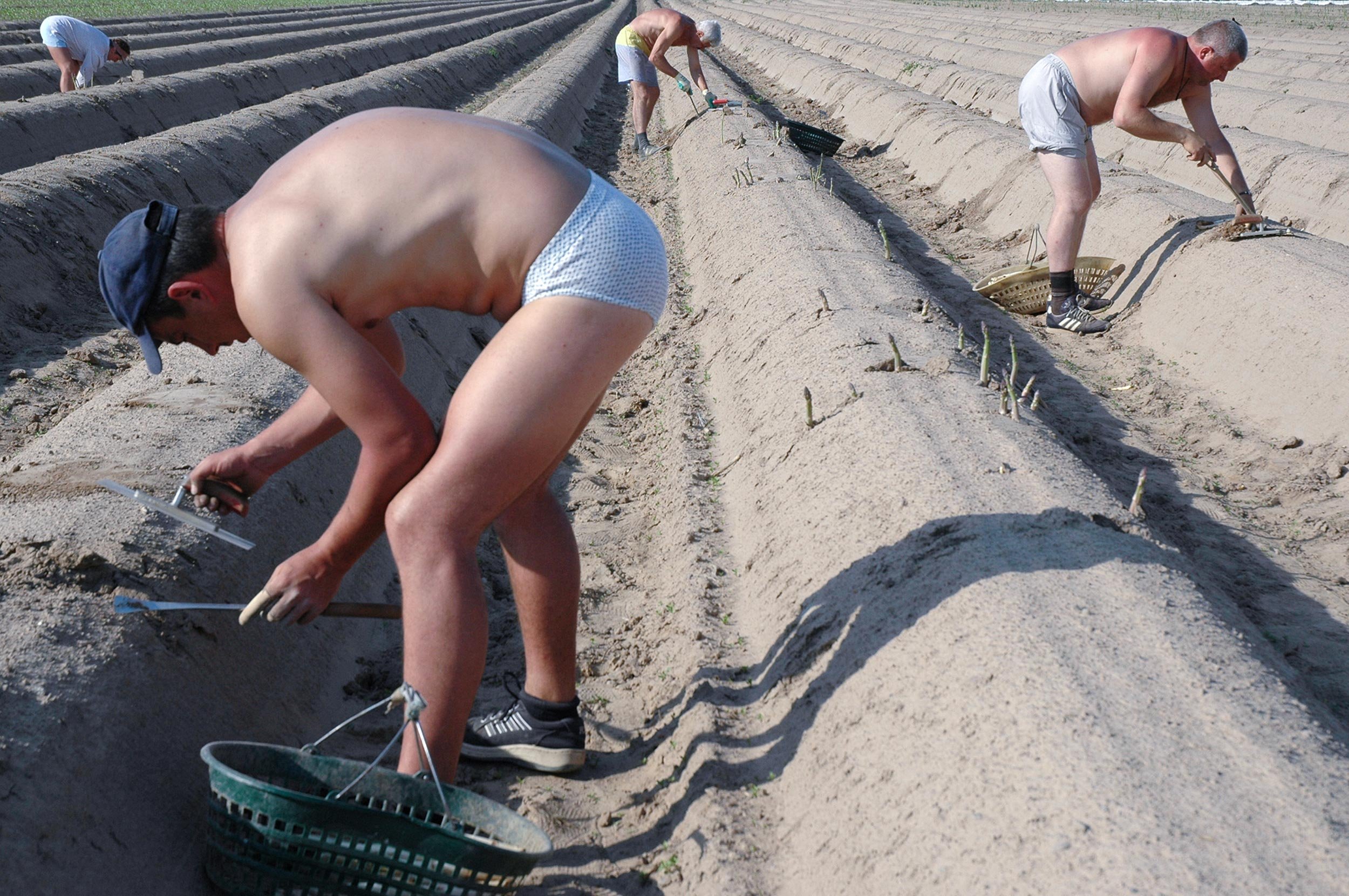
The project concept began with this photo in Weiterstadt, Germany 2007. These people working under intense heat which provokes that they do their activities without some of their clothes, one of them even in underwear.

In the grass, lying in the shade of a tree, this woman makes a ten minute break and smokes. On her neck is the key of her room, the same way others do in order not to lose it.

Washed clothes of the workers are hanging outside to get dry.

Sunburns due to work under the sweltering heat.

During the lunch break, They all are waiting in line at the dining room for food.Every day it is prepared by the hotel operators for the asparagus picker. It costs 4 euros each meal.
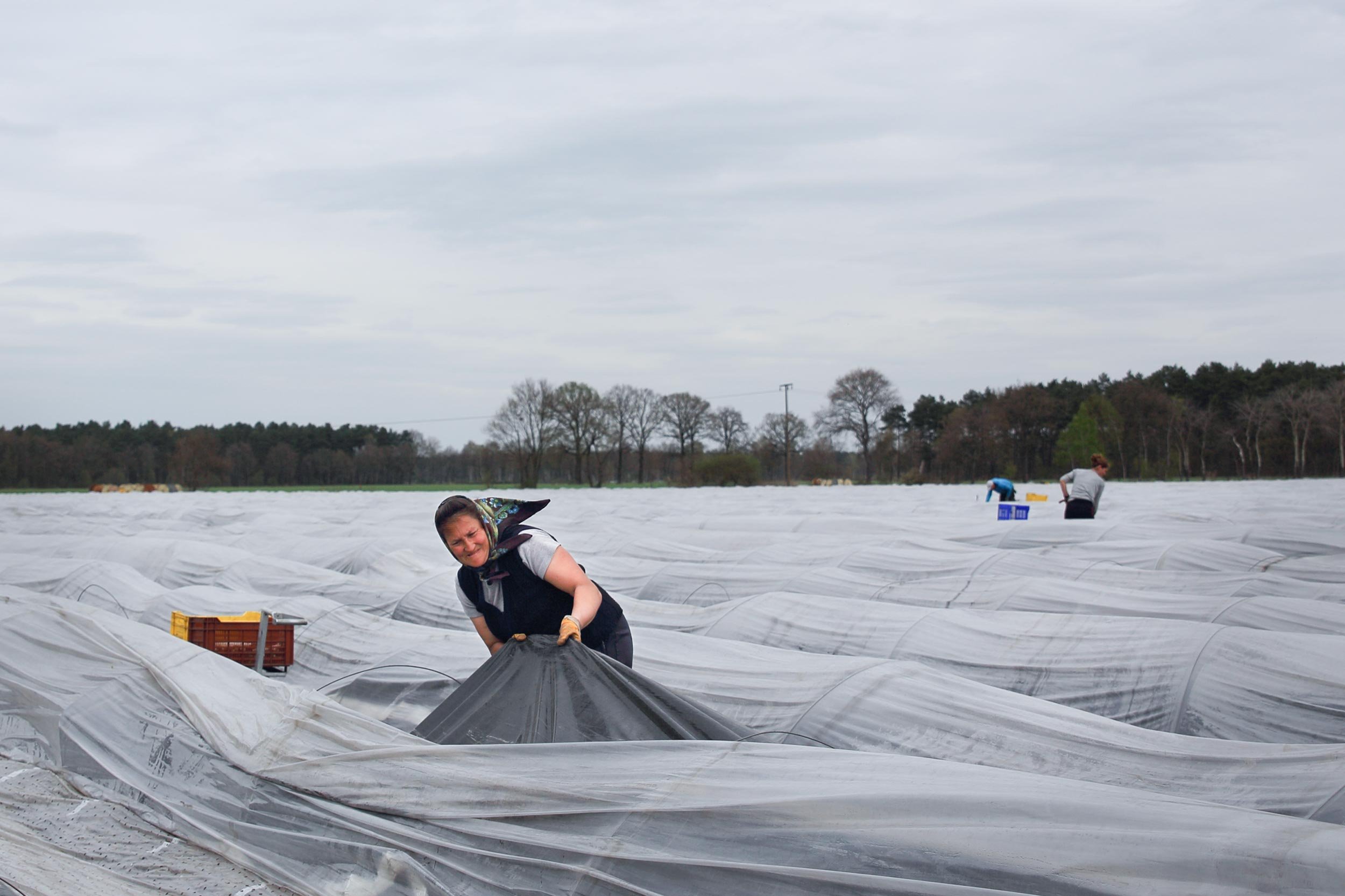
The plastic that protects the asparagus,in the course of the day it‘s harder and harder to take it out, especially for women.

The farm bus, where the workers are transported to work.

The room of working clothes and tools, a worker relaxes after a long day at work. Starting work a day by 5am and get of at 6pm, with a two-hours lunch break.

A woman working in the asparagus fields.It is a hard work but the money she earns here in Germany is very valuable in her country.

After a long day at work playing ping pong, is a popular Recreational and leisure. These men play up to 11:30 pm

At night, after 23 hours, this couple has finally time for themselves. Both are from Poland, they met here this work-season.
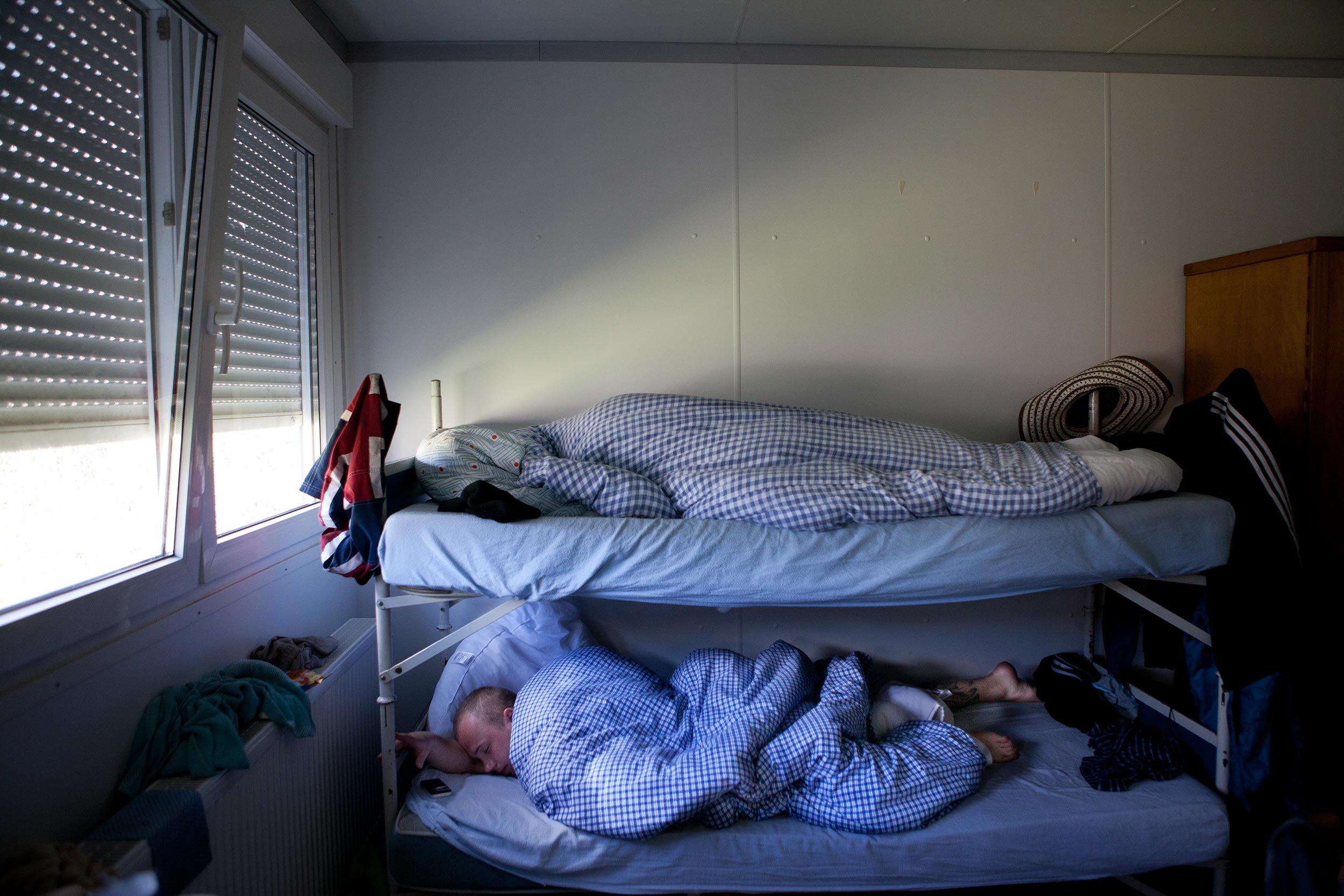
During their break after eating , some workers sleep in their rooms. They have only 30 minutes then they must go back to work again.
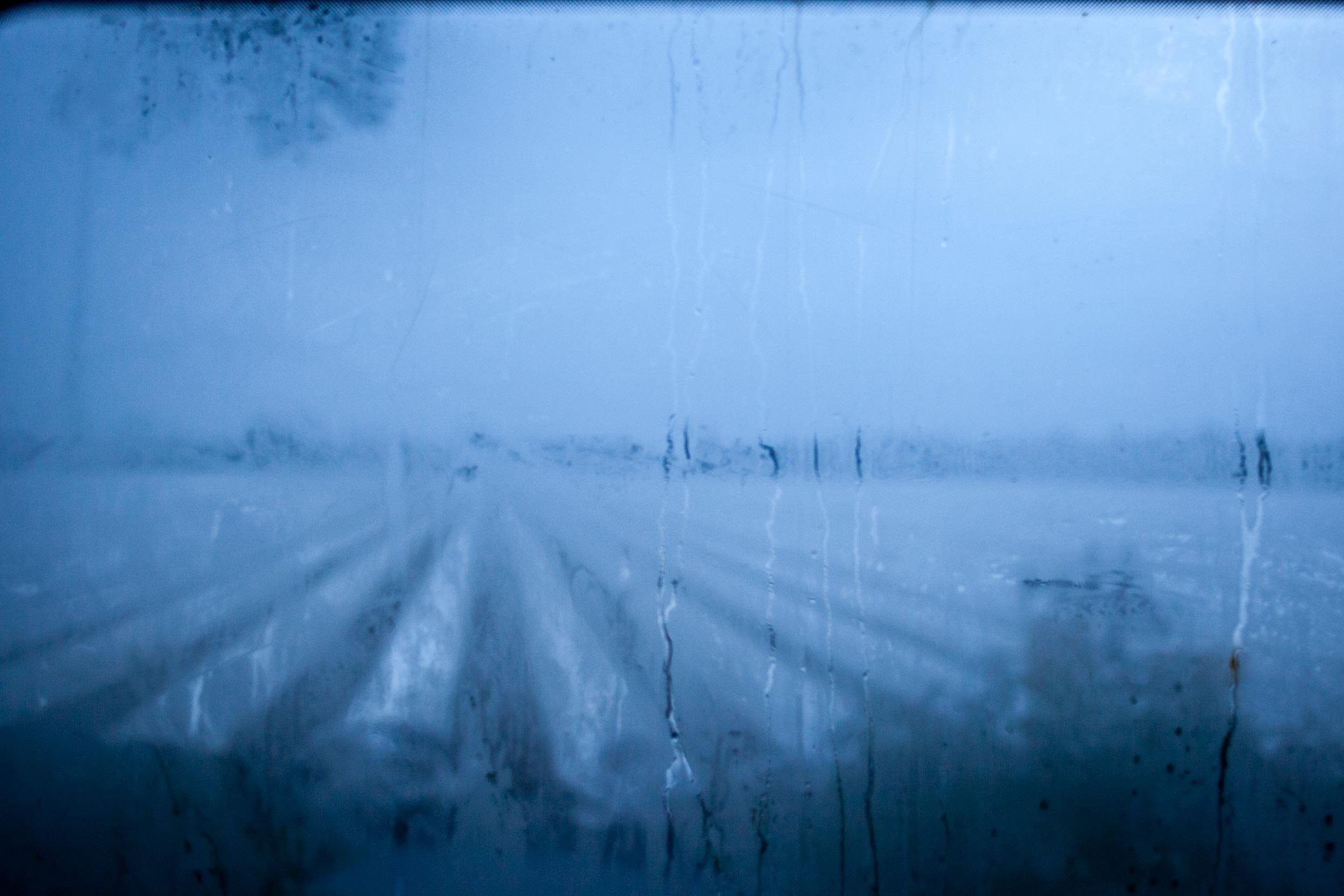
The asparagus fields through a wet window of the bus. It is five clock in the morning and it‘s raining a little.

Worker preparing for a new workday.

These people are waiting to be brought to the hotel by bus.It is around 6 pm, every day it’s the same routine.

plates with food.

The workers go to bed , they have to be prepared each morning at 3:50am. The bus which takes them to their place of work, rides at 4:30am.
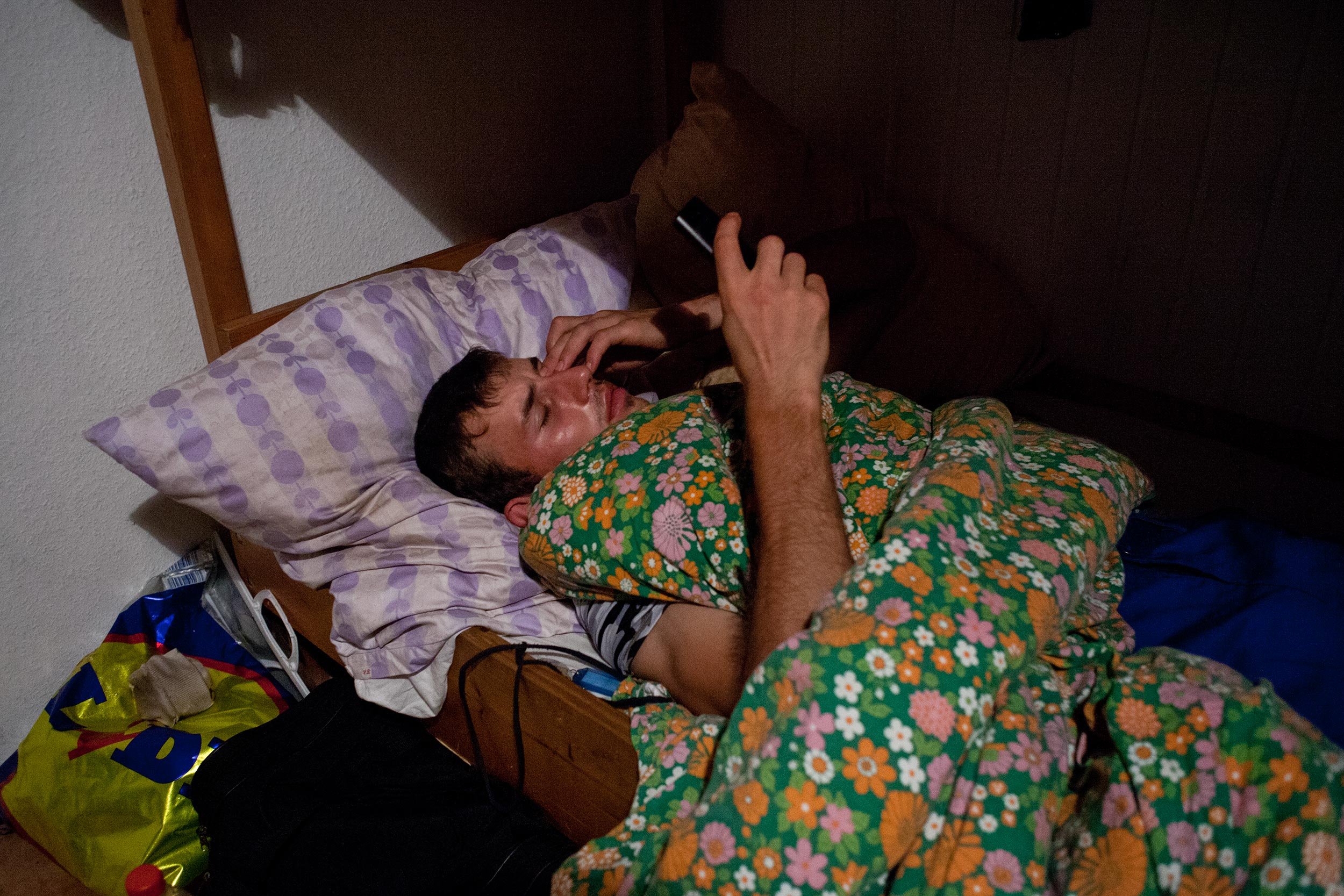

workers playing cards in their free time.

They work every day, 10 hours a day starting 5 clock in the morning.

They toil in sun, rain and cold.

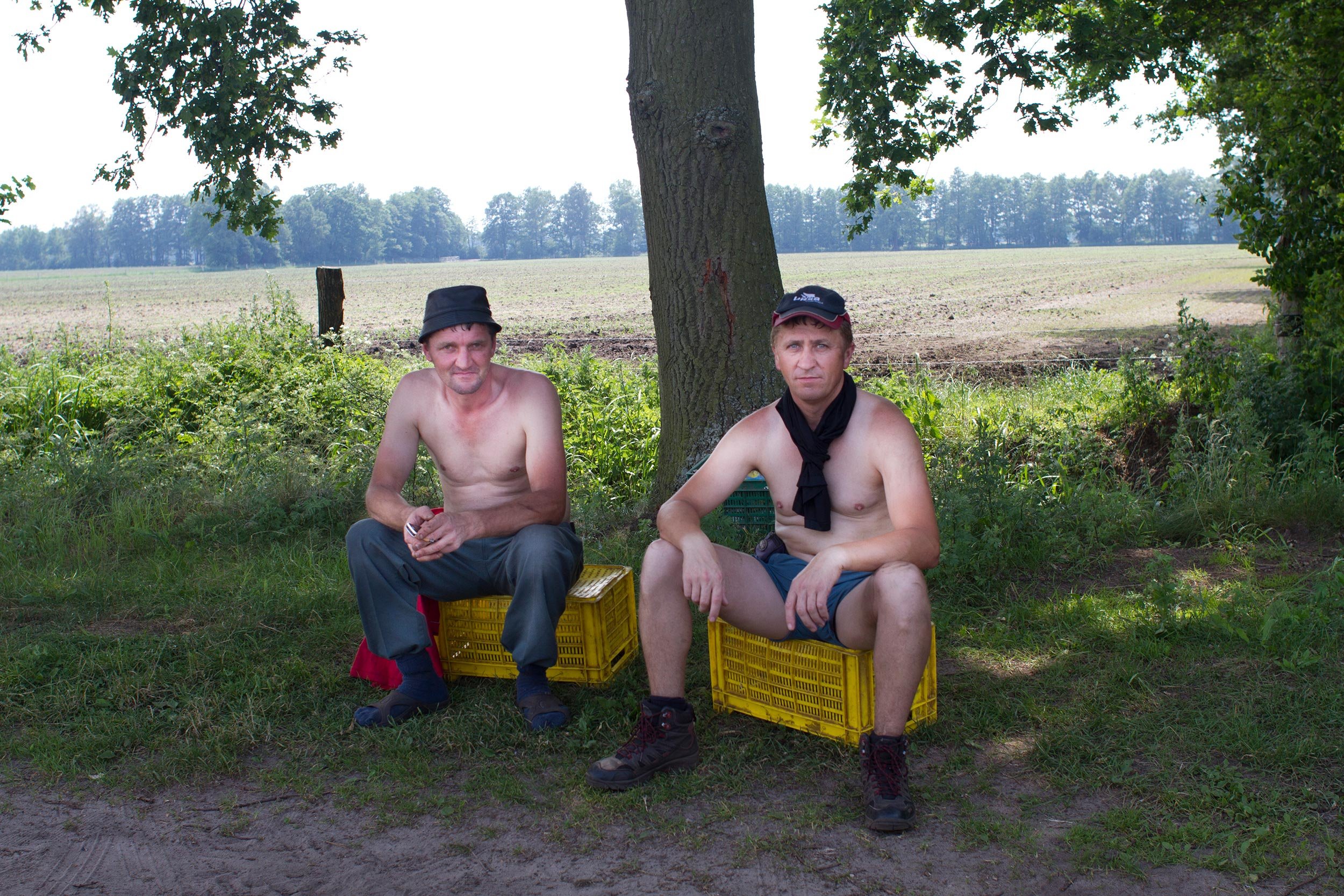

A worker shows the photo of his family; his wife and daughter have to wait for his return.

Late in the evening , these roommates are talking and laughing, they drink also some alcohol and let the work behind for a moment.

The room of working clothes and tools. This clothing ,raincoat and boots as well, must be brought by the workers themselves. The farm provides them only the tools that they need.

Chapter I. Asparagus Season, Germany 2013.
Every year approximately 270 000 workers come to Germany to reap the harvest, they are all foreigners, most of them from Poland and Romania - without these people, it would be impossible to reap because most of unemployed German people who are looking for a job are not willing to do it. Foreign workers are allowed to work in Germany for about 56 days. They work every day, 10 hours a day starting at 5 o'clock in the morning. This year (2013), they get 27-57 cents for each kilo harvested and that depends on the size of the asparagus. They toil in sun, rain and cold.
This is a look into the lives of a group of harvesters in one of the many farms in Germany that bring foreigners for their annual reap. It shows us not only how they work in different situations and under the toughest conditions but also their leisure time, their life together and the lifestyle these people have during their work in Germany.
Germany April - June 2013
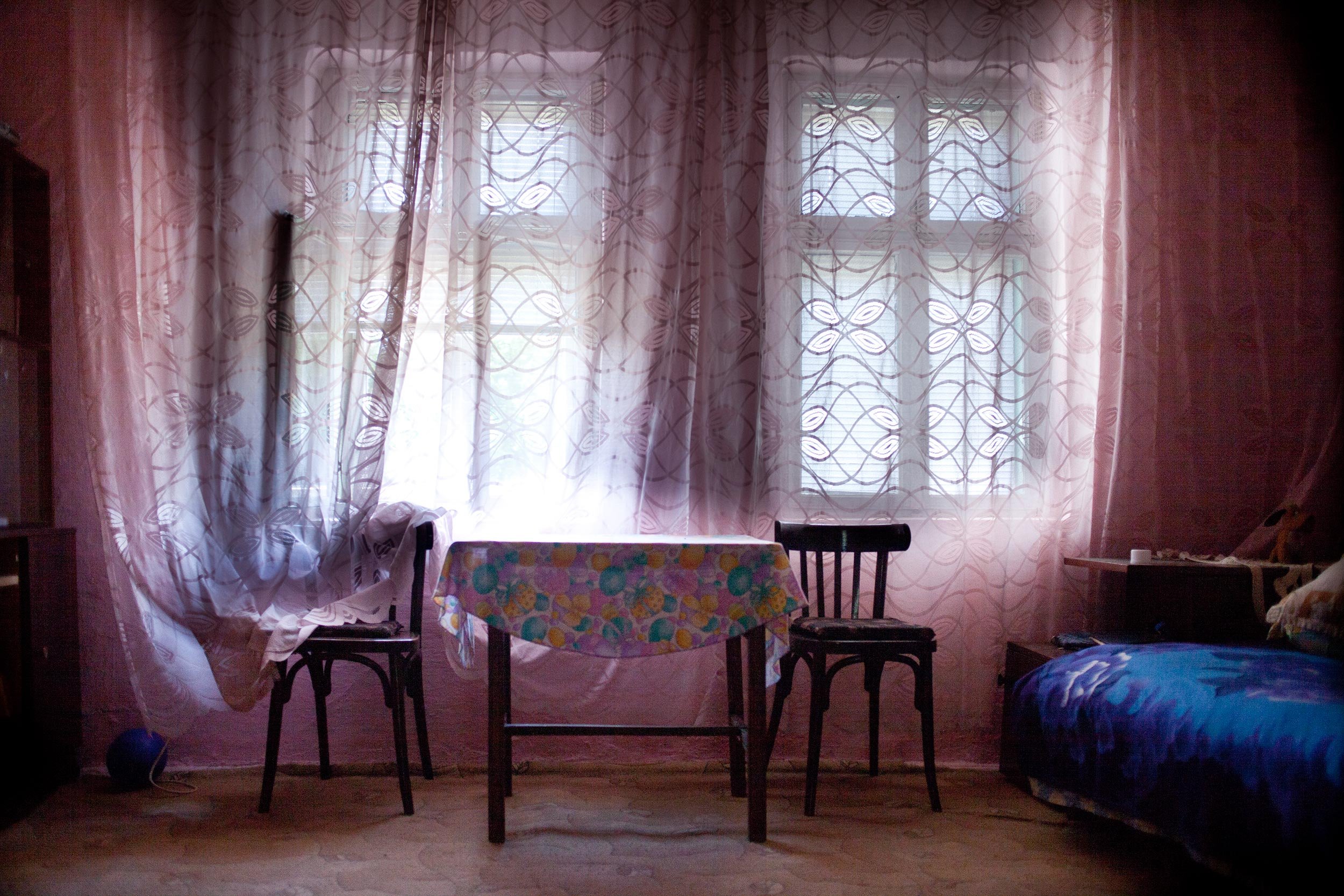
Pojoga, Hunedoara, Romania.
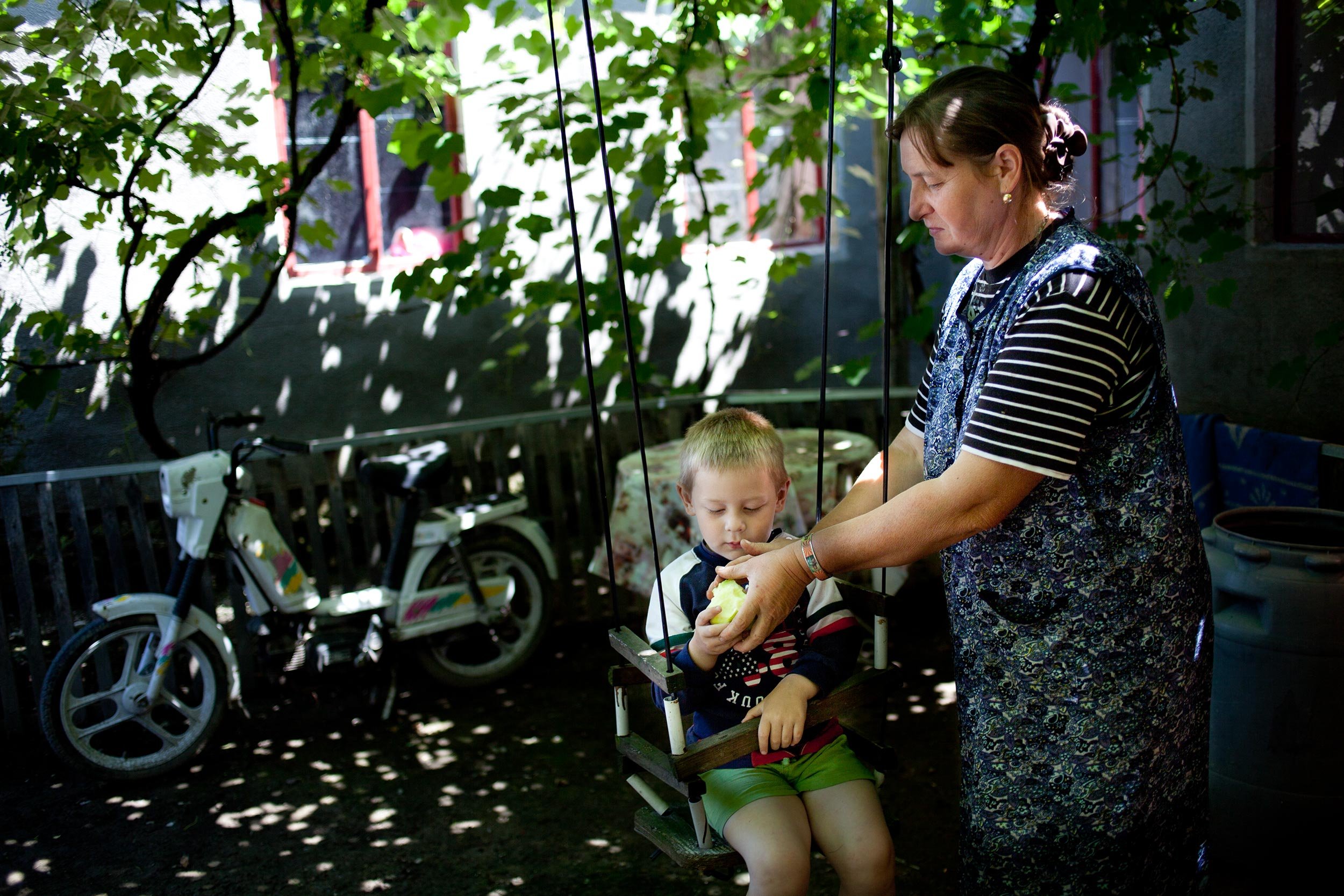
María takes care of her son, crops and animals while her husband Cristi is in Germany for the asparagus season. Pojoga, Hunedoara, Romania

Craiova, Romania.
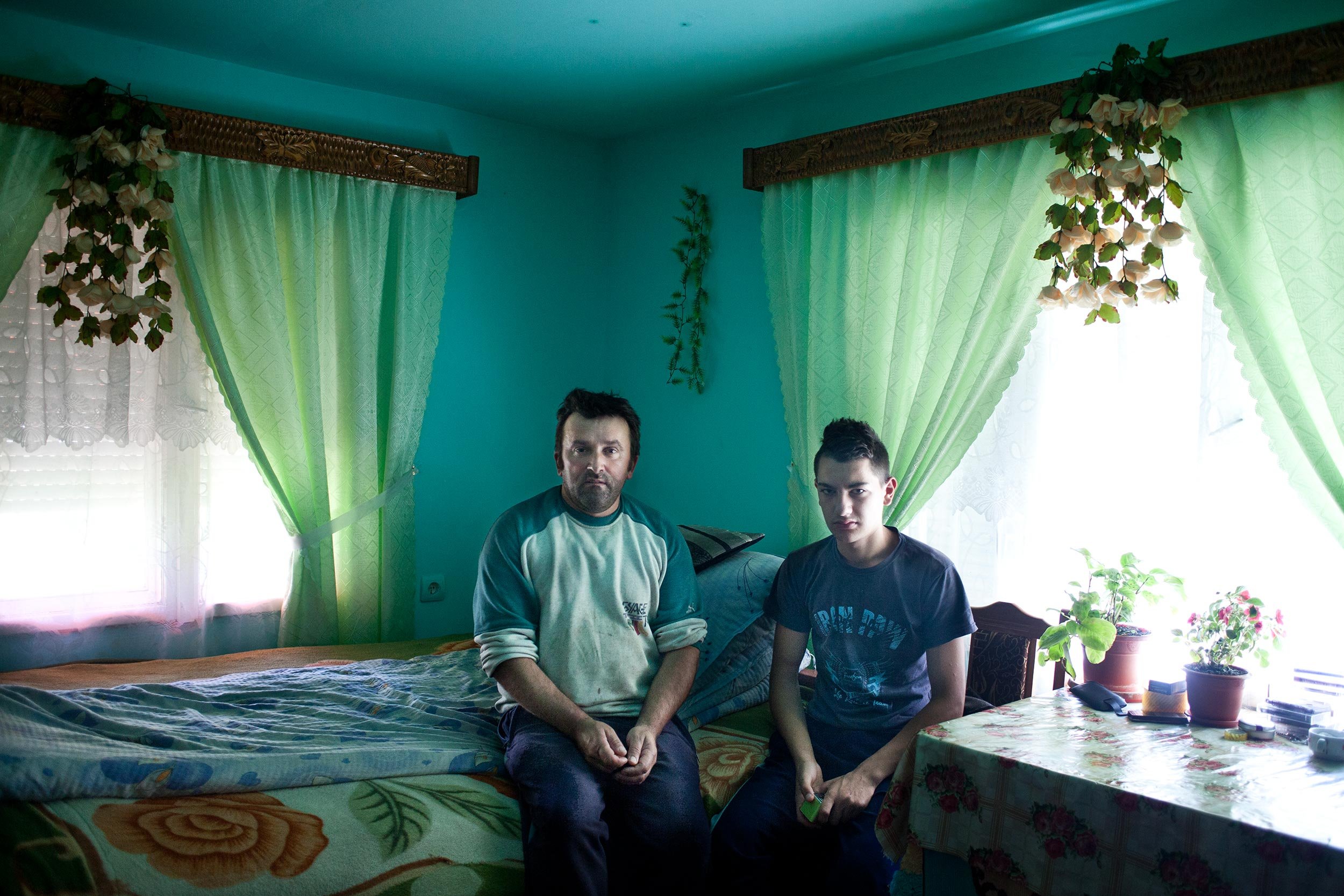
Doru has worked in Spain and Germany in seasonal jobs. He doesn't want to go back next year and leave his family, lands and animals alone again. Viseu de Sus, Maramures -Transilvania, Romania

Maramures -Transilvania, Romania.2014

The room where Alina and her husband temporarily live. Her husband has been taking seasonal jobs for some years. She went to Spain for a season with her husband but she did not like the country, she prefers to wait for him back in Romania every season. They are saving part of their earnings to build a house. Viseu de Sus, Maramures -Transilvania, Romania.
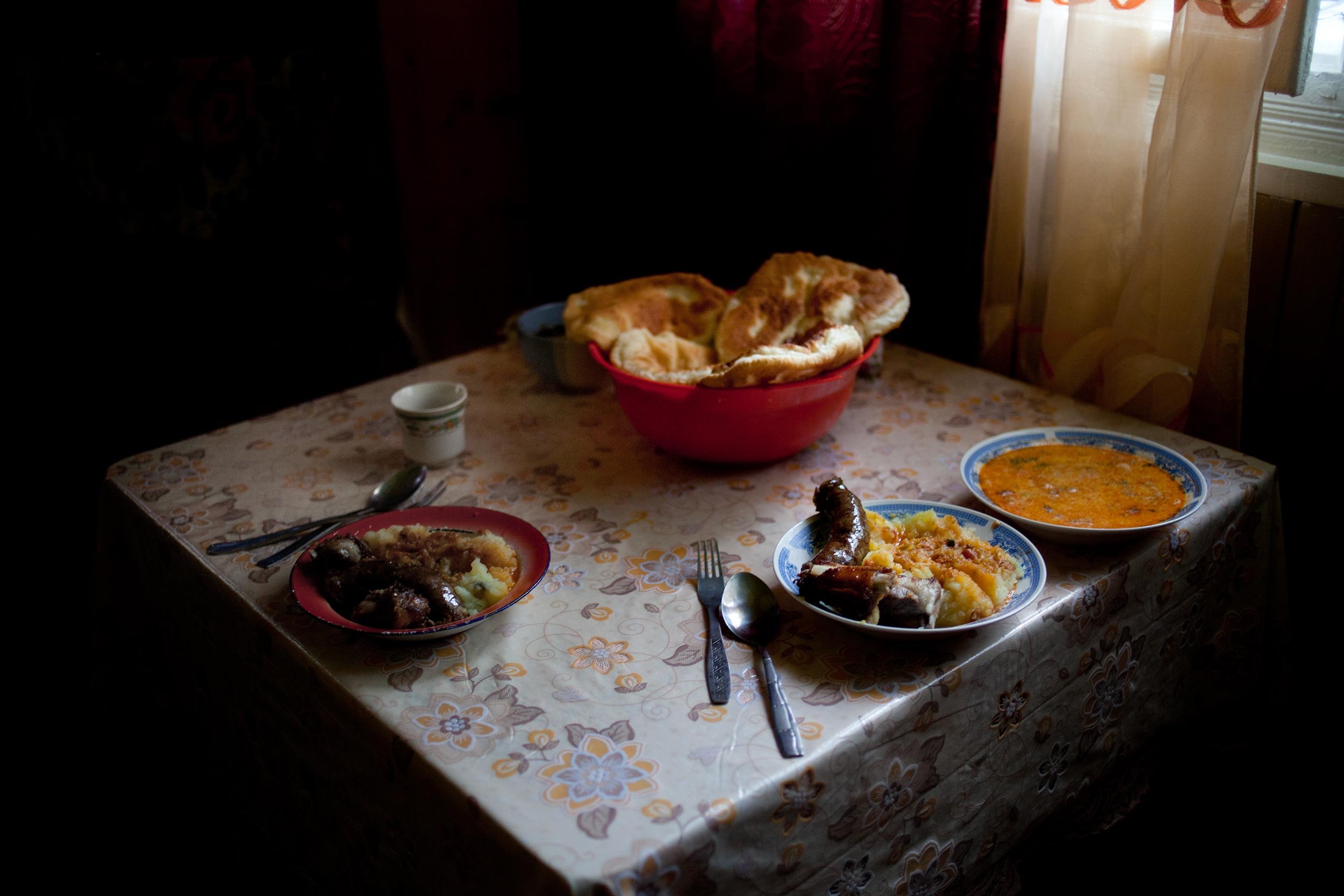
Viseu de Sus, Maramures -Transilvania, Romania

Viseu de Sus, Maramures -Transilvania, Romania.
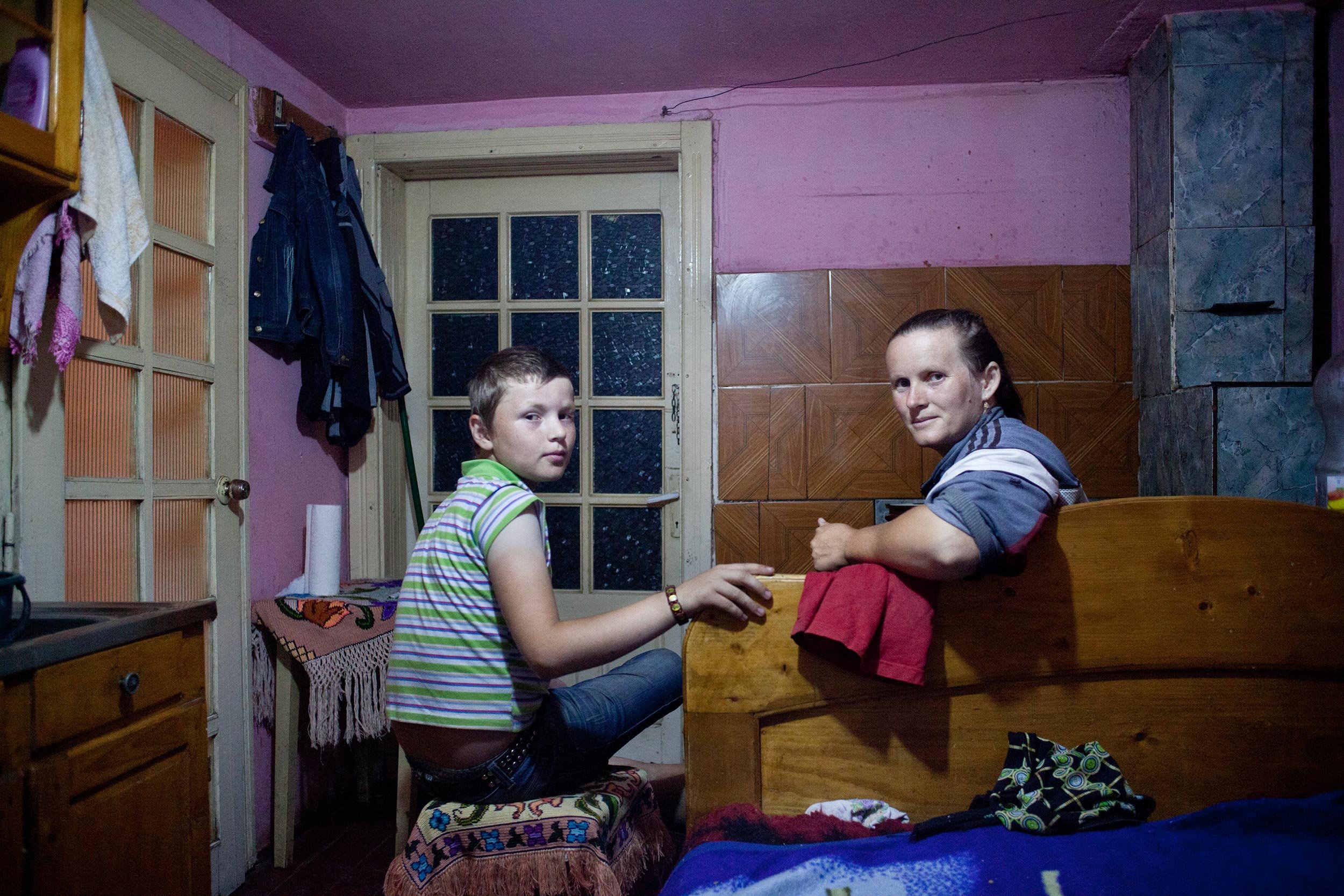
Anutsa and her son. She has to look after the crops and the animals of her home while her husband, Vasilo, works during the asparagus season in Germany. Viseu de Sus, Maramures -Transilvania, Romania.2014

Viseu de Sus, Maramures, Transilvania. Romania

Vasilo has been traveling to Germany for the asparagus season for 8 years. He has also been in the olives season in Spain. Viseu de Sus, Maramures -Transilvania, Romania.
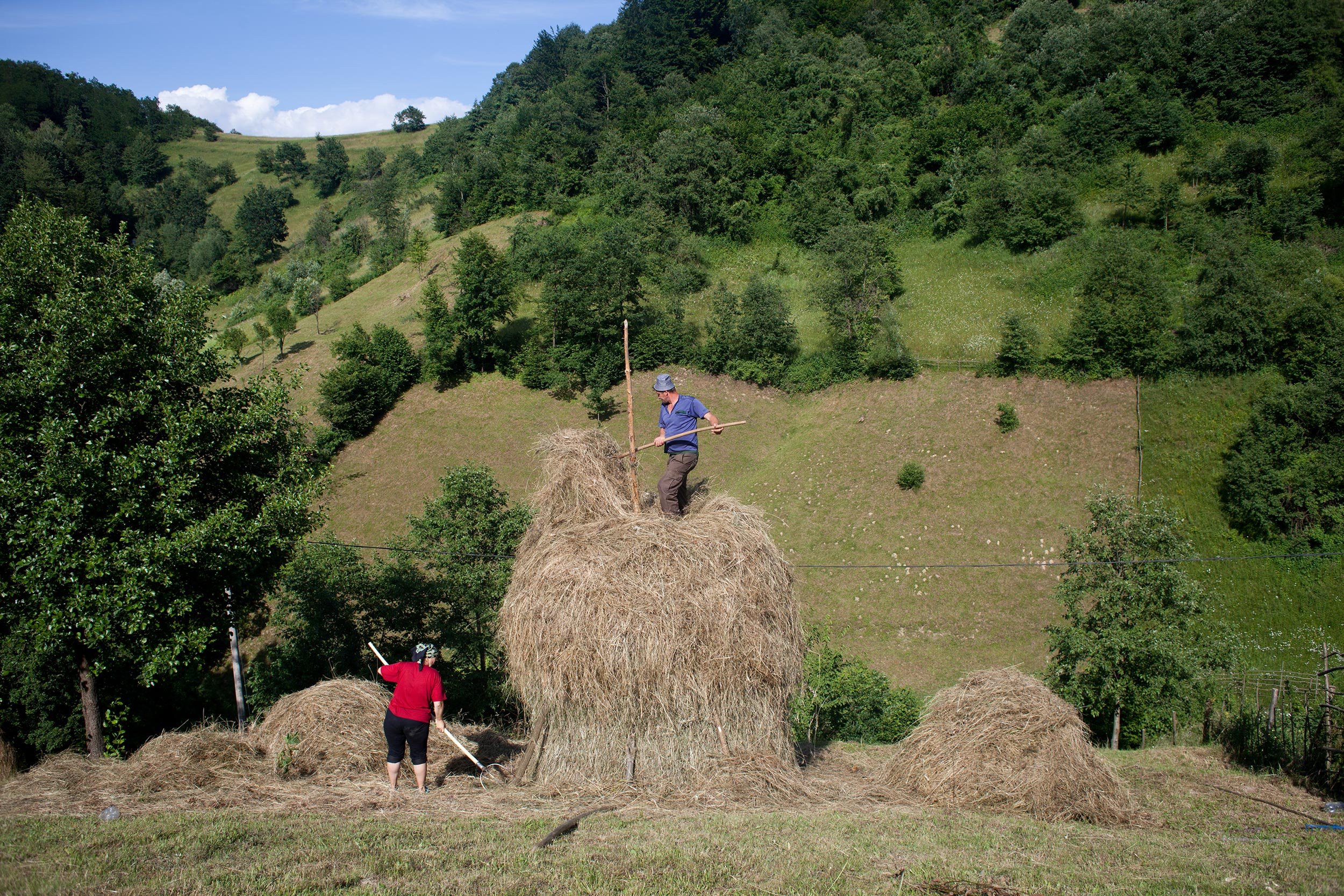
Vasilo and his wife Anutsa preparing the straw for the winter, hills of Maramures in the north of Romania. In their town, farming and cattle raising are the only jobs he has. Viseu de Sus, Maramures, Transilvania. Romania.

These people produce butter and cheese for their own consumption. Pojoga, Hunedoara, Romania

When Rodica is working in Germany, her daughters Alina and Roxi have to do the housework. Marian, their father, works as a mechanic and truck driver. Salciva, Hunedoara, Romania.
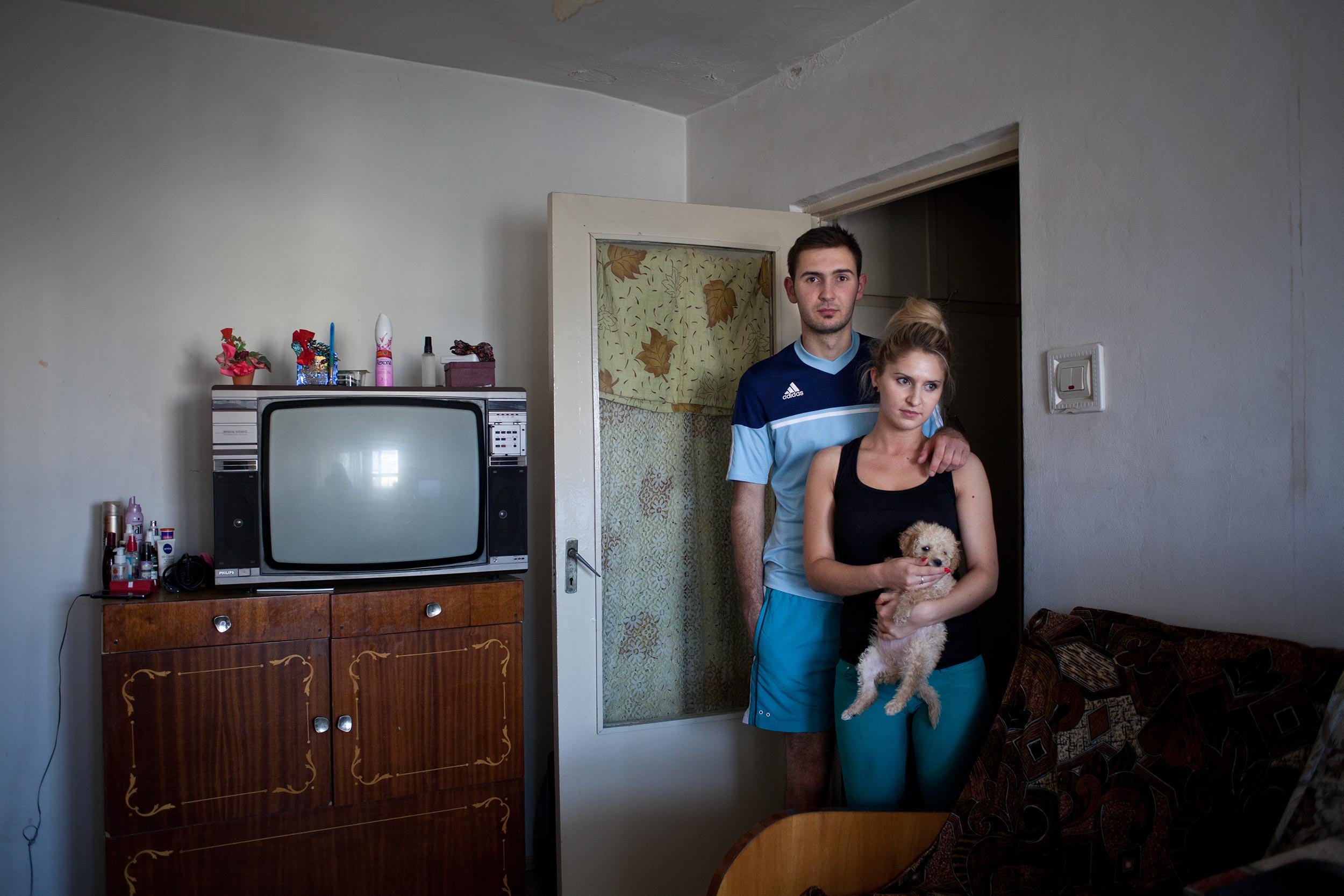
Vlady has been coming to Germany for the past 2 years to work as an asparagus harvester. In Romania, he and his girlfriend live together in 35-square meter room. With the money he has obtained in Germany, he paid the rent for a whole year. Back home he works in an office and earns 250 Euros a month. Deva, Romania.

Deva, Romania.

Daniel has been working for four years in the asparagus season in Germany. He wants to get married in three years. Therefore, he needs to save some of his money and live the rest of the year with what he has left. His mother also works during the asparagus season in Germany. Craiova, Romania.

Petruta in her kitchen still under construction. She's been working for the past four years as a seasonal worker, she starts in Italy then she goes to Spain and then to Germany. With her wages, she continues with the construction of her own house back in Romania. Craiova, Romania.

Petruta entering her house still under construction. With the combined wages of Petruta and her son, earned during the asparagus season in Germany, they are trying to finish the building of their house. Craiova, Romania.

Craiova, Romania.


This was the first year for Ana working in the asparagus season in Germany. With her wages she bought a washing machine, paid some debts and saved some for the rest of the year. Salciva, Hunedoara, Romania.

Salciva, Hunedoara, Romania.

Nicola is a farmer in Salciva, Hunedoara. Cristina is her 17-year old daughter and stays at home taking care of the animals and housework when her mother is working in the asparagus season. Salciva, Hunedoara, Romania.

Pojoga, Hunedoara, Romania.

Ana has been working for 4 years in Germany during the asparagus season. Nelu, her husband, works as an electrical engineer in another city 35km away. They bought a car for Nelu so he can continue with his job with the money earned in Germany. Pojoga, Hunedoara, Romania.
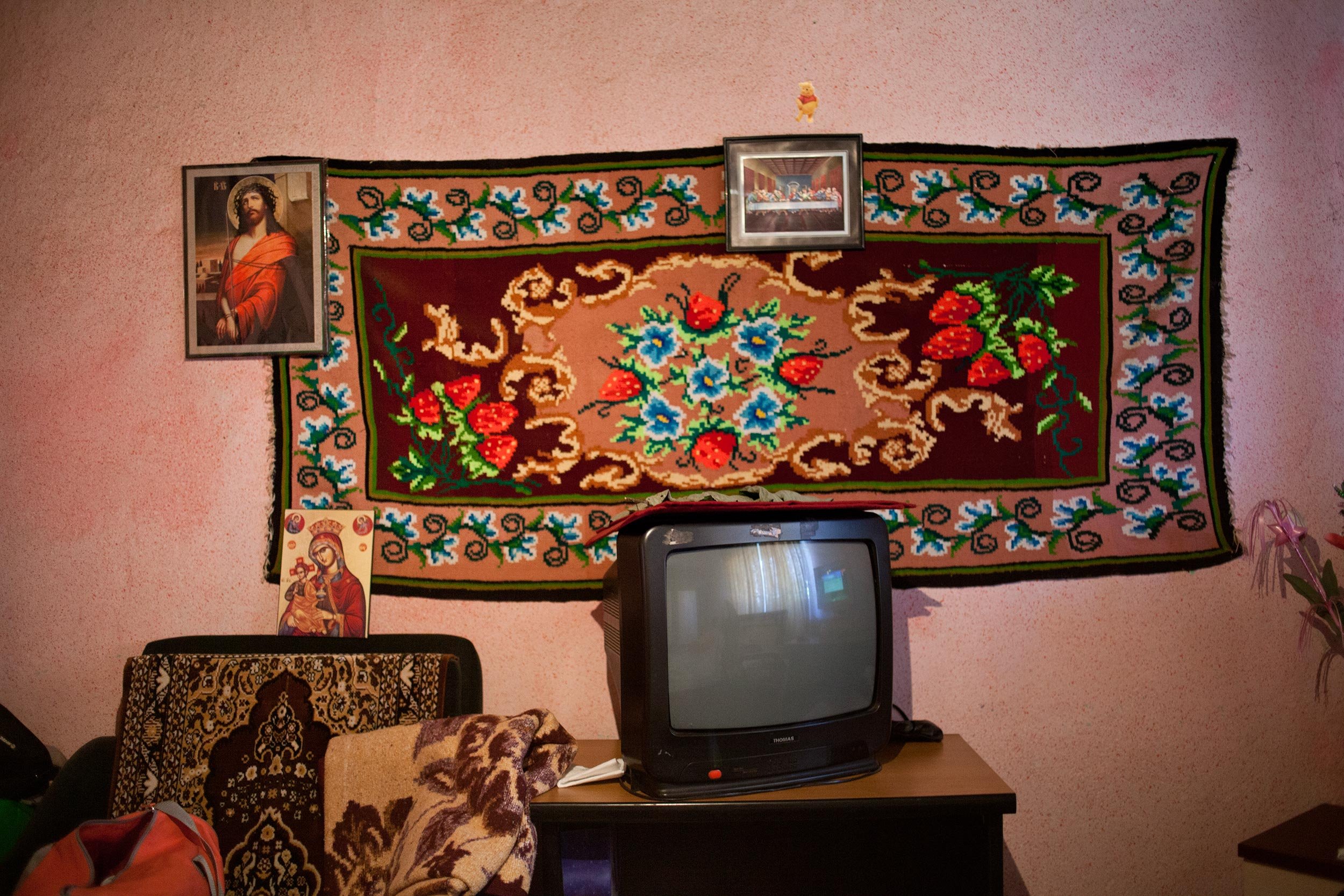
Salciva, Hunedoara, Romania.

Cristi’s been going to the asparagus season in Germany for 4 years. Part of the money he earns is to pay debts; the other part has to be distributed along the year. Last year’s money was used to buy a car for his oldest son. Pojoga, Hunedoara, Romania.

Pojoga, Hunedoara, Romania.
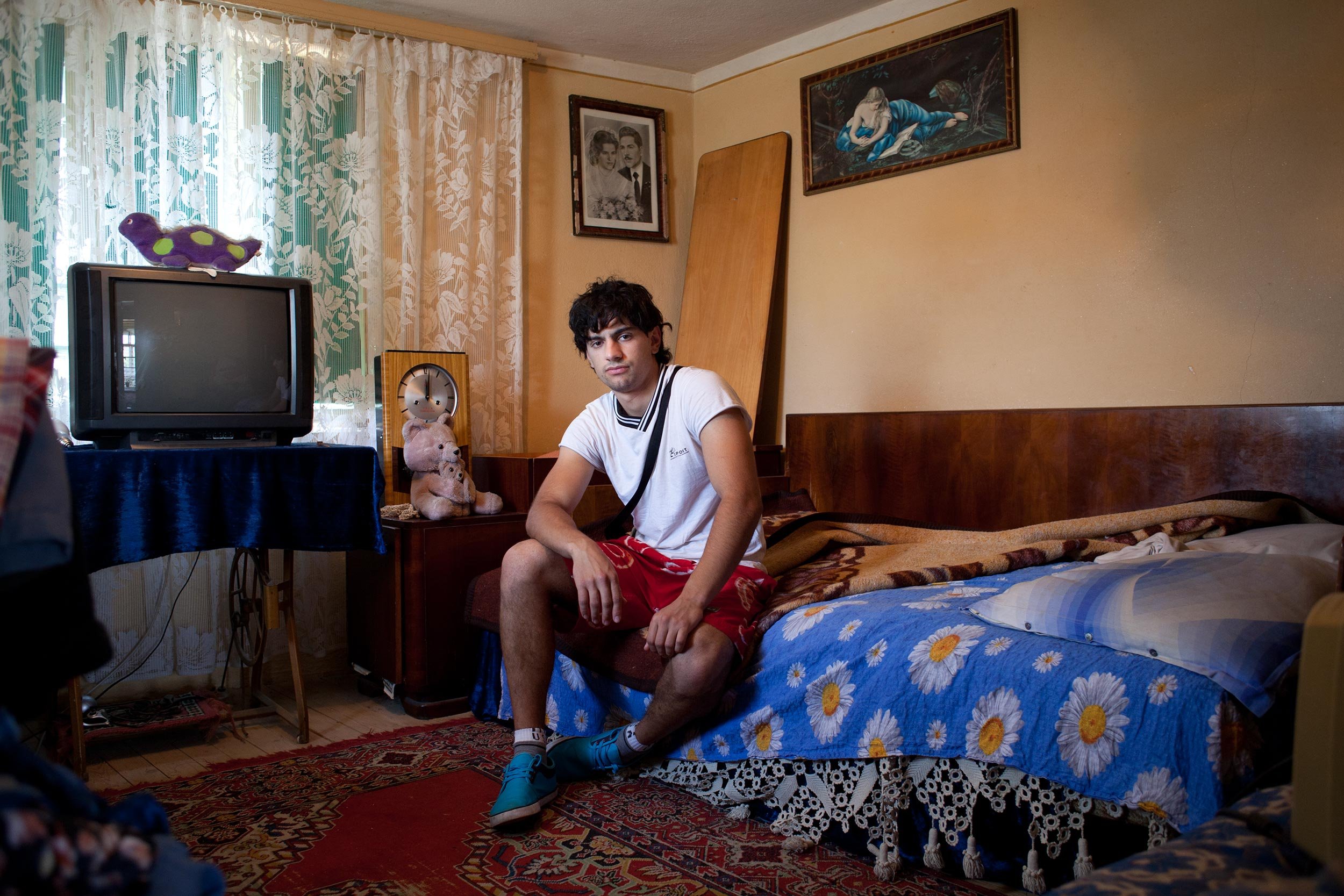
This was the first year for Dari in the asparagus season in Germany. Since he has no other work in Romania he wants to work again in Germany next year. He lives with his grandparents in Craiova. Craiova, Romania.
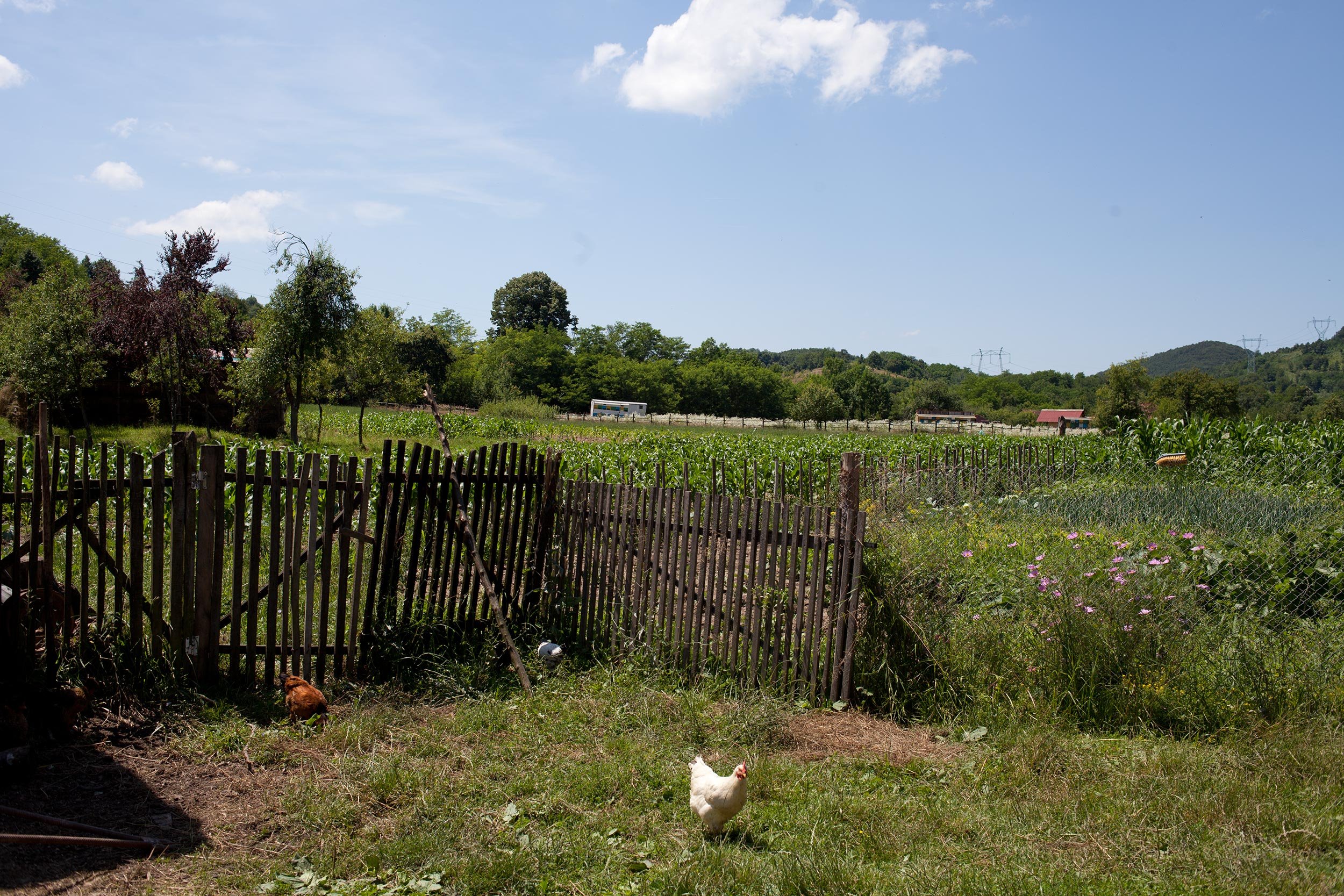
Chapter II. At Home, Romania 2014.
The Family of these seasonal workers has to wait for them in their respective countries, few families travel together searching for these type of job. In most cases somebody remains taking care of the house, children and even, if they have a farm, of the animals. This photo series is focused on the family members of the workers who remain in their countries; on some workers who have stayed in home this season and some details of their life when they are not working in some other place.
Different cities, towns, ways of life and histories but all of them have something in common; they work in another country where they receive a better wage then return home with their families after the season is over. Many of them have this work and survive with this only income all year until the next season starts. Some others have a job back home but very badly paid so this tend to be the reason why these people have to leave home looking for better payment for a better life for them and their families.
June- July Romania 2014.

This young Senegalese has been working as seasonal worker for 8 years in Spain; he doesn‘t want to sleep in the shelter so he sleeps in an improvised tent in the darkness of a park. Often people don‘t want to sleep in the shelter as documentation is requested and some of them do not have it. He hasn‘t found a job in this city this year so tomorrow he will continue looking for a job in another town.

Road to Jaén. If these seasonal workers do not find a job in the city, they will continue to the next one until they find something.This is the destiny of many immigrants when they arrive to Europe. After a long and dangerous journey to arrive to Spain they must find a way to make a living here and send money to their family in their home country.

Group of workers in the meeting place waiting for their boss (the landowner) as they do every morning. In the group, there are only Spaniards and a Moroccan that has been working for 7 years in the same group. Before the crisis more people could be seen waiting in the meeting point, including more immigrants. Some of the workers were not even part of the group but they used to speak with the boss requesting for a job. That is not the case this year.



Immigrants working in the olive harvesting. Immigrants are often hired because they are considered strong workers that do not argue the work rate.Some workers use machinery that is usually very heavy.

Senegalese worker pulling the nets where the olives are collected. Luckily, he is one of the few that have had a contract to work every year for the harvesting for the past 8 years. He has 3 daughters in his home country to whom he must send money.

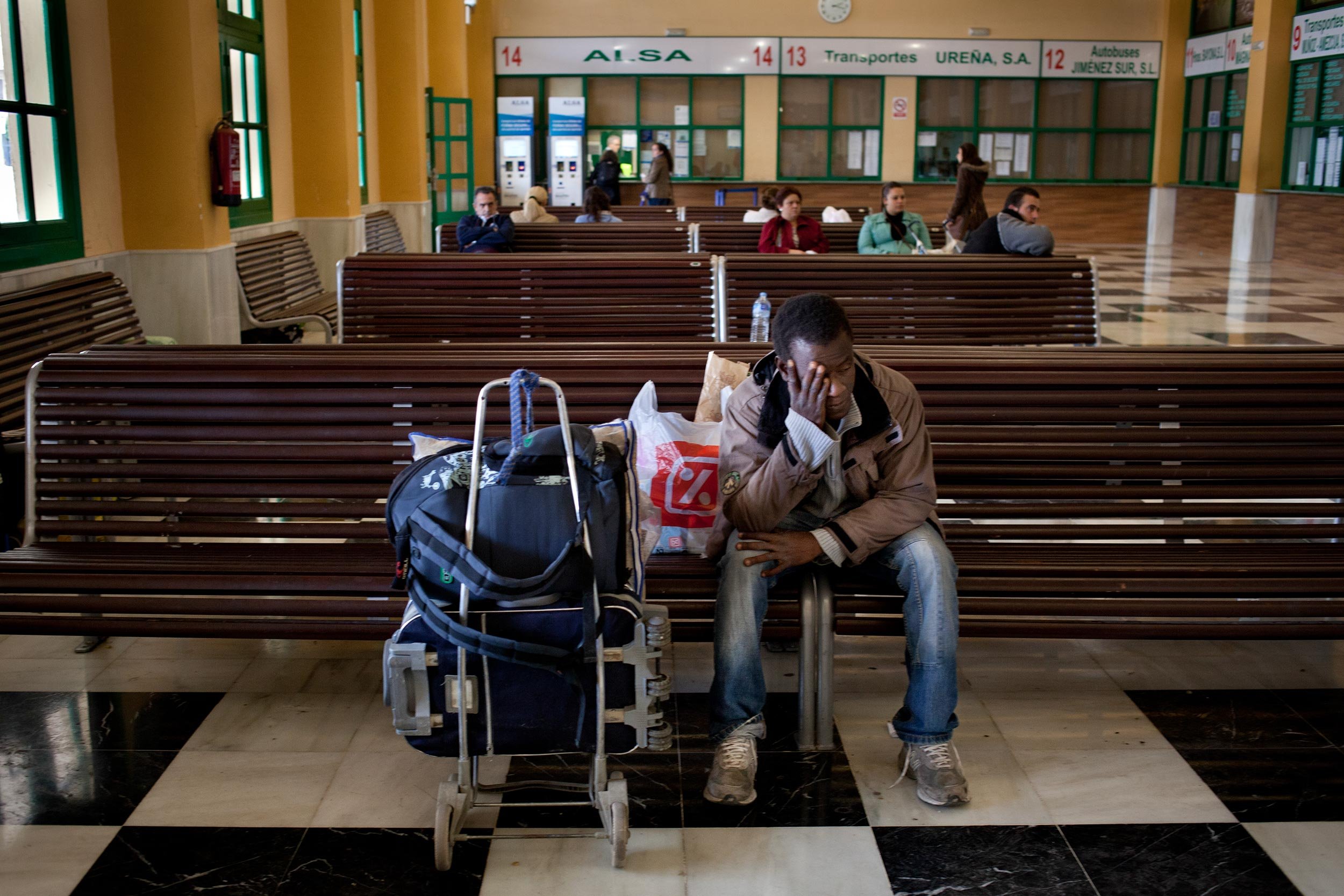
Young from Senegal waiting for the bus. He's been living and working in Spain as seasonal worker for the past 8 years. He didn't find a job this year in Jaén so he has to go to the next town looking for it. If these seasonal workers do not find a job in the city, they will continue to the next one until they find something. This is the destiny of many immigrants when they arrive to Europe. After a long and dangerous journey to arrive to Spain they must find a way to make a living here and send money to their family in their home country.
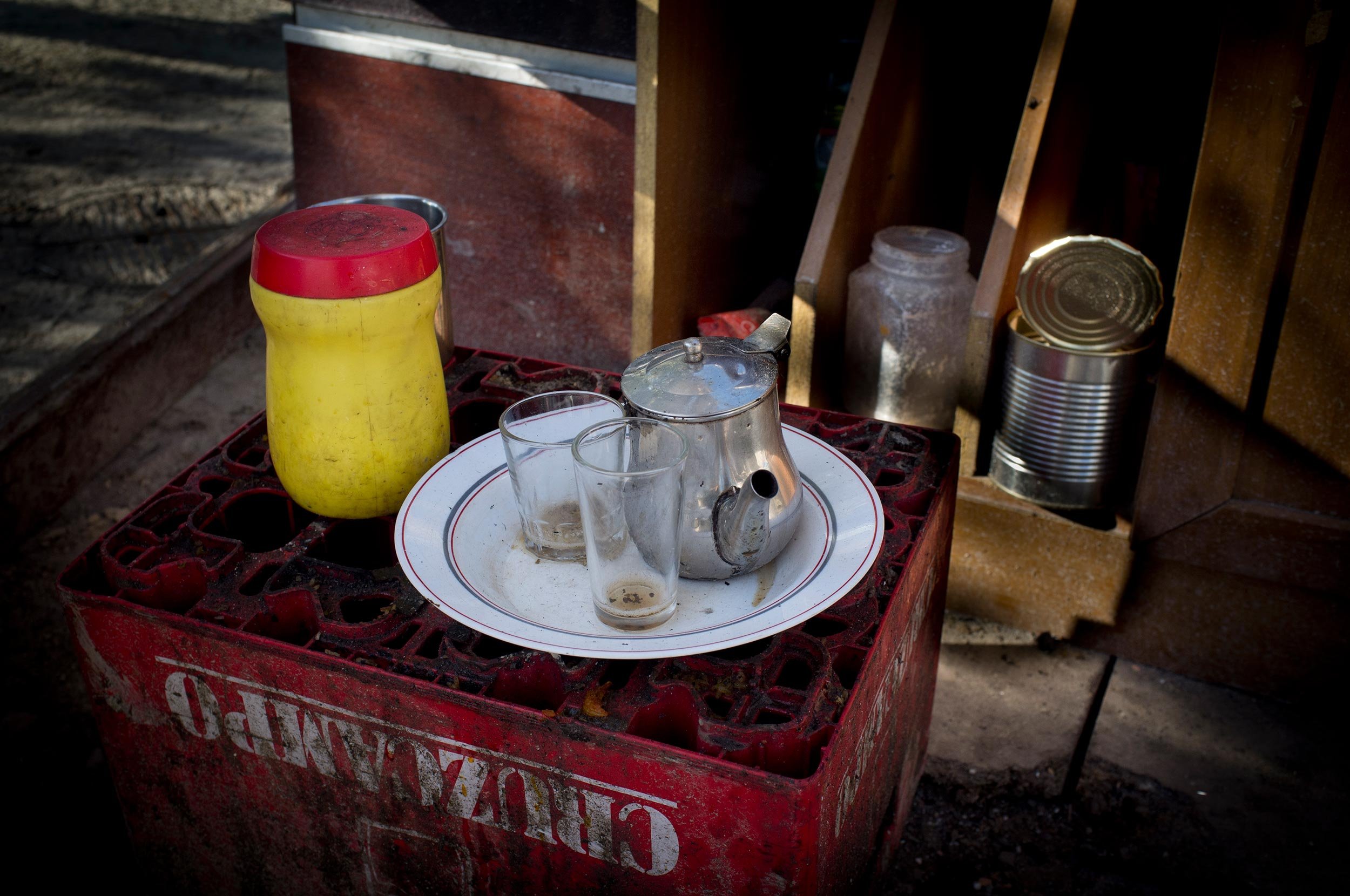
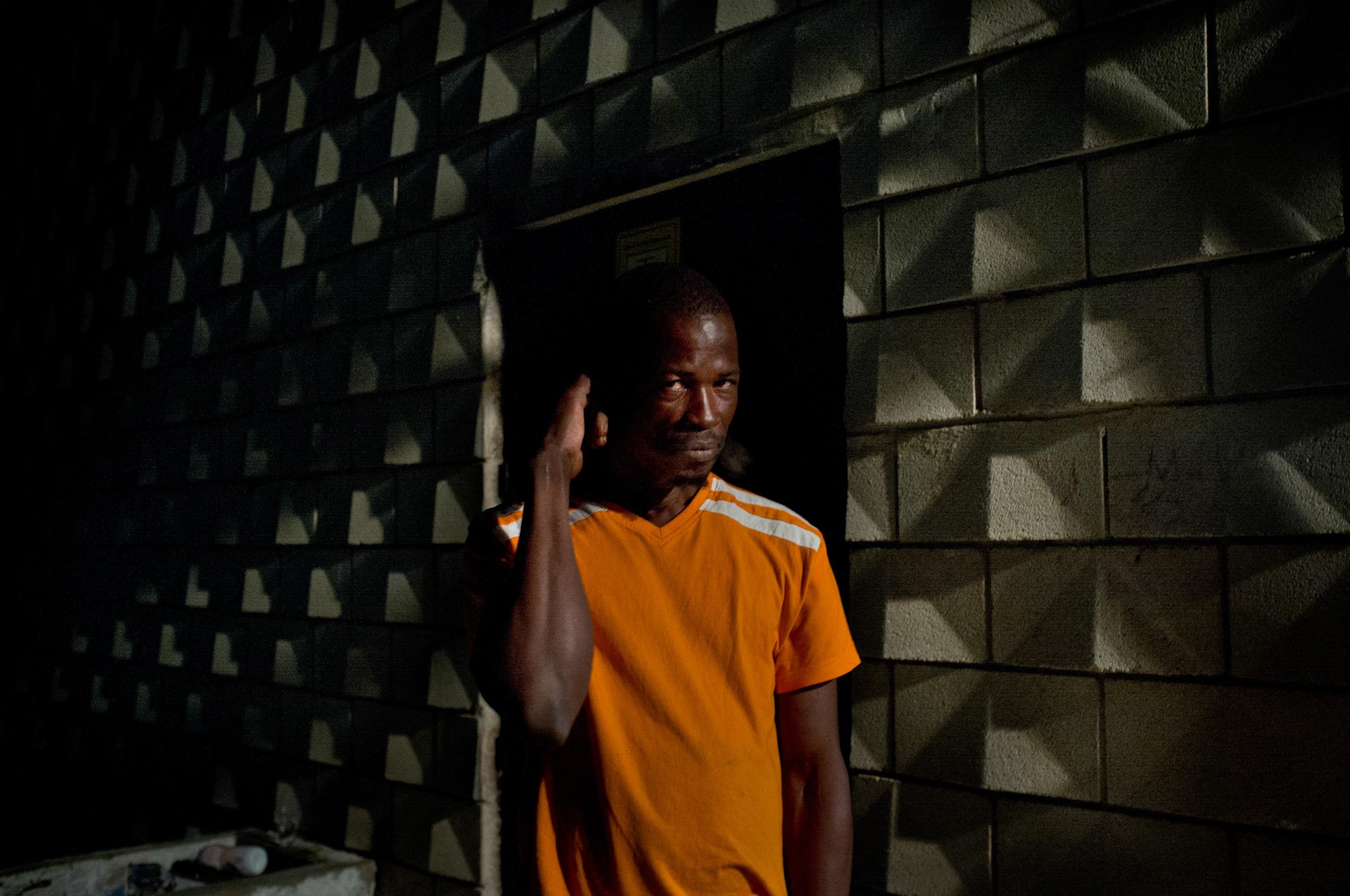



"I'm aware that we've taken jobs form the hands of many of these immigrants" says Angel, a Spanish citizen who used to have a very good position in a construction company and was forced to work in the in the olive harvesting after the crisis. He's been working for 7 years in the olive harvesting.

Rafael working in the harvesting of olives. In the past, this was only a work for immigrants or people with low academic level, after the crisis it became mandatory to work where he can. The season of olives is a good opportunity.Rafael is a Spanish citizen. After the crisis he lost his job as a tradesman and for the past 8 years he‘s been working in the olive harvesting.


Road to Jaén. If these seasonal workers do not find a job in the city, they will continue to the next one until they find something.This is the destiny of many immigrants when they arrive to Europe. After a long and dangerous journey to arrive to Spain they must find a way to make a living here and send money to their family in their home country.

Senegalese worker beating with a twig the olives that were in the high part of the Olive (tree). He‘s been working for the same landowner over the past 8 years.
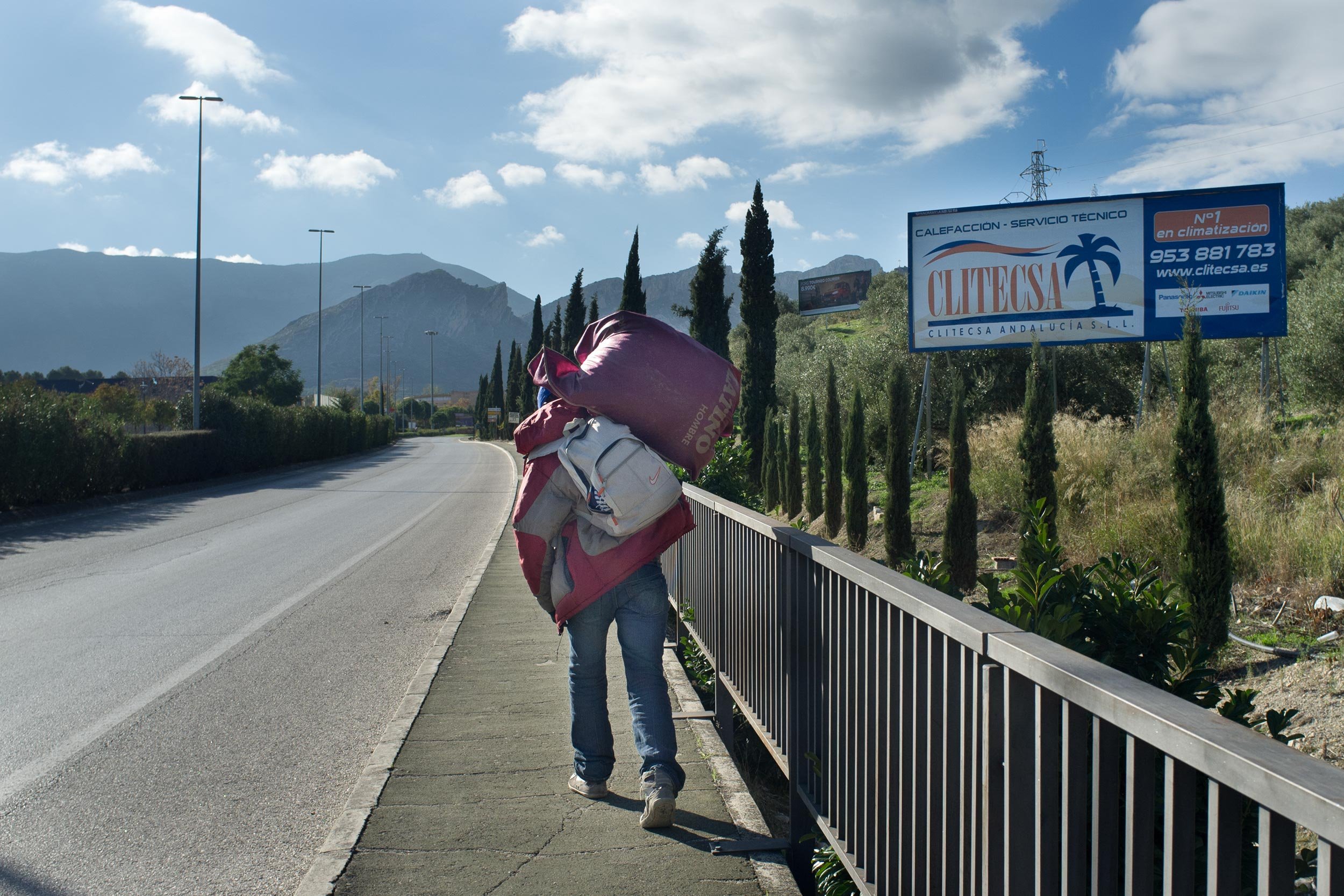
This young Senegalese is on his way to the bus-station, he is going to travel to a neighboring town where he will be working for around 20 days expecting those become more or that after this job he can find another one. If he doesn't find a job, he will return to Jaén where his companions are living in a park where he also stays sometimes waiting for the season to start or until a new job comes up in the next city.
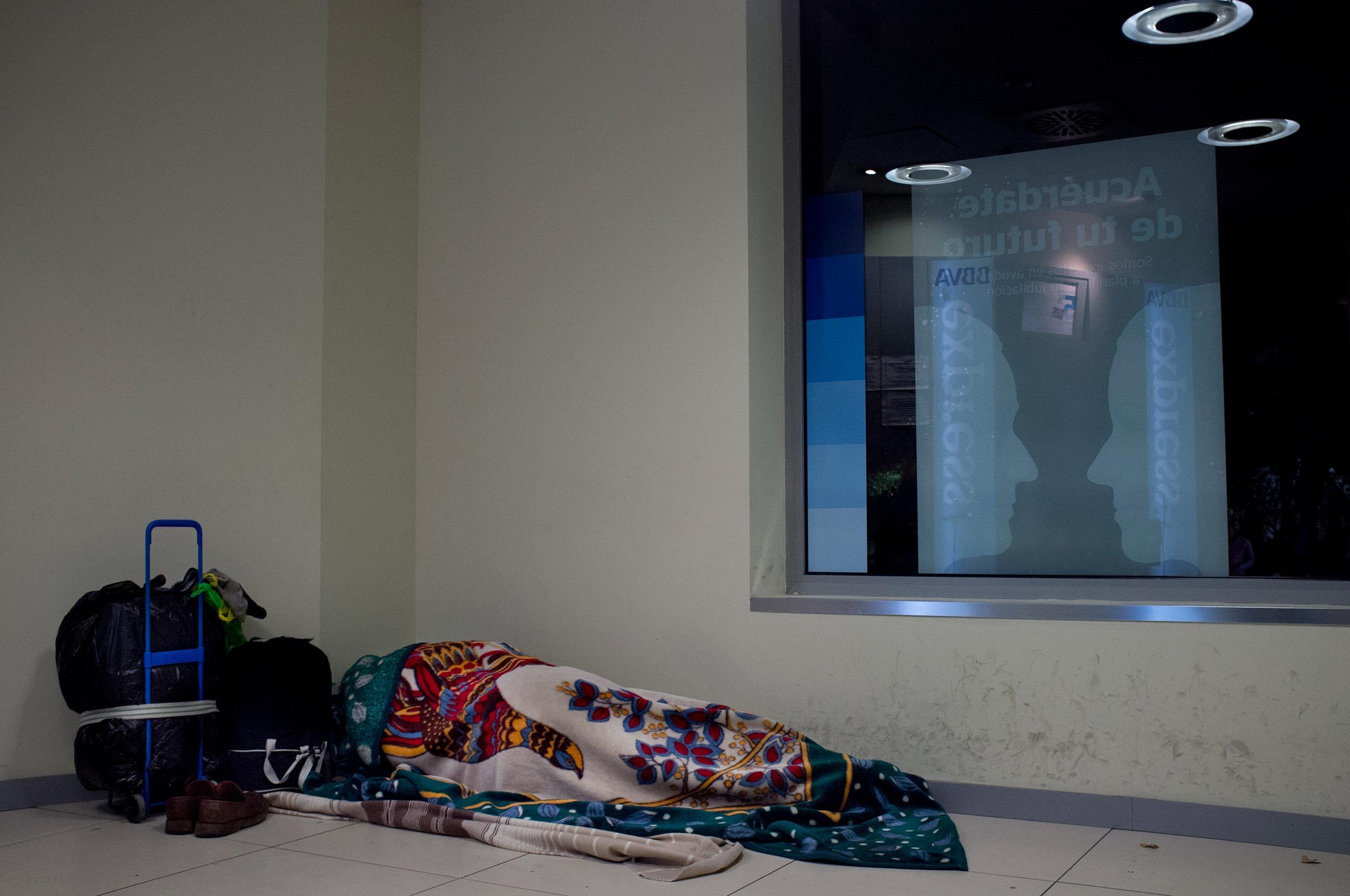
Many of these seasonal workers prefer to sleep in their tents on the streets or inside ATMs of the city since the shelters request, their documentation and some of them do not have it.


Pause after work. Workers from Senegal have had their work assured for some years. Since the landowner contracted them, they managed to obtain their documents so they can work without problems in Spain. When apple seasons begin, they all need to move to the next city where they also have a fixed contract. Many of the immigrants are able to work for a good landowner who helps them with their documentation, for others this is more difficult so they‘ve been working in Spain without papers.
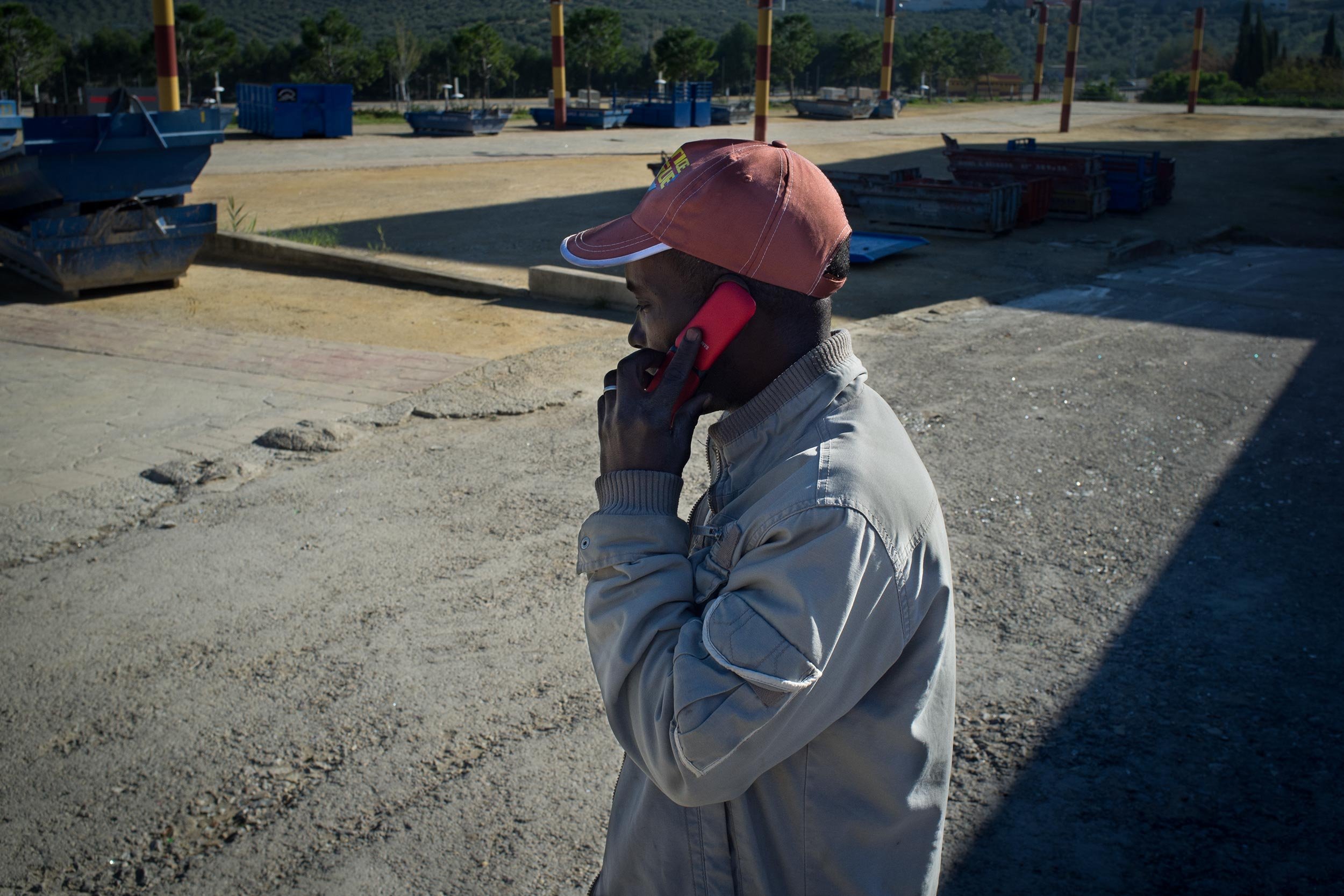
Seasonal worker from Guinea speaks with his companion of a near city asking him if there is work there. These workers usually travel alone, but they are always calling their contacts to have some idea of where to go next. He knows that finding a job in Spain is becoming harder so he's planning to travel to France or Germany next year.

Ibraham from Western Sahara says; "where were the Spaniards 10 years ago when we, the immigrants, alone made the harvesting of the olives” In Jaén he didn´t obtain a job. He sleeps today in the shelter that the city offers to these workers, tomorrow in the early hours of the morning he´s going to take the bus to another city of Spain looking for a place to work. For more than 20 years, he has been traveling and working throughout Spain as a seasonal worker.

Portrait of a young Senegalese who lives in his shack in a park of Jaen. He has work for the next 20 days in a town near Jaén, he has been living and working as seasonal worker in Spain for the past 8 years.
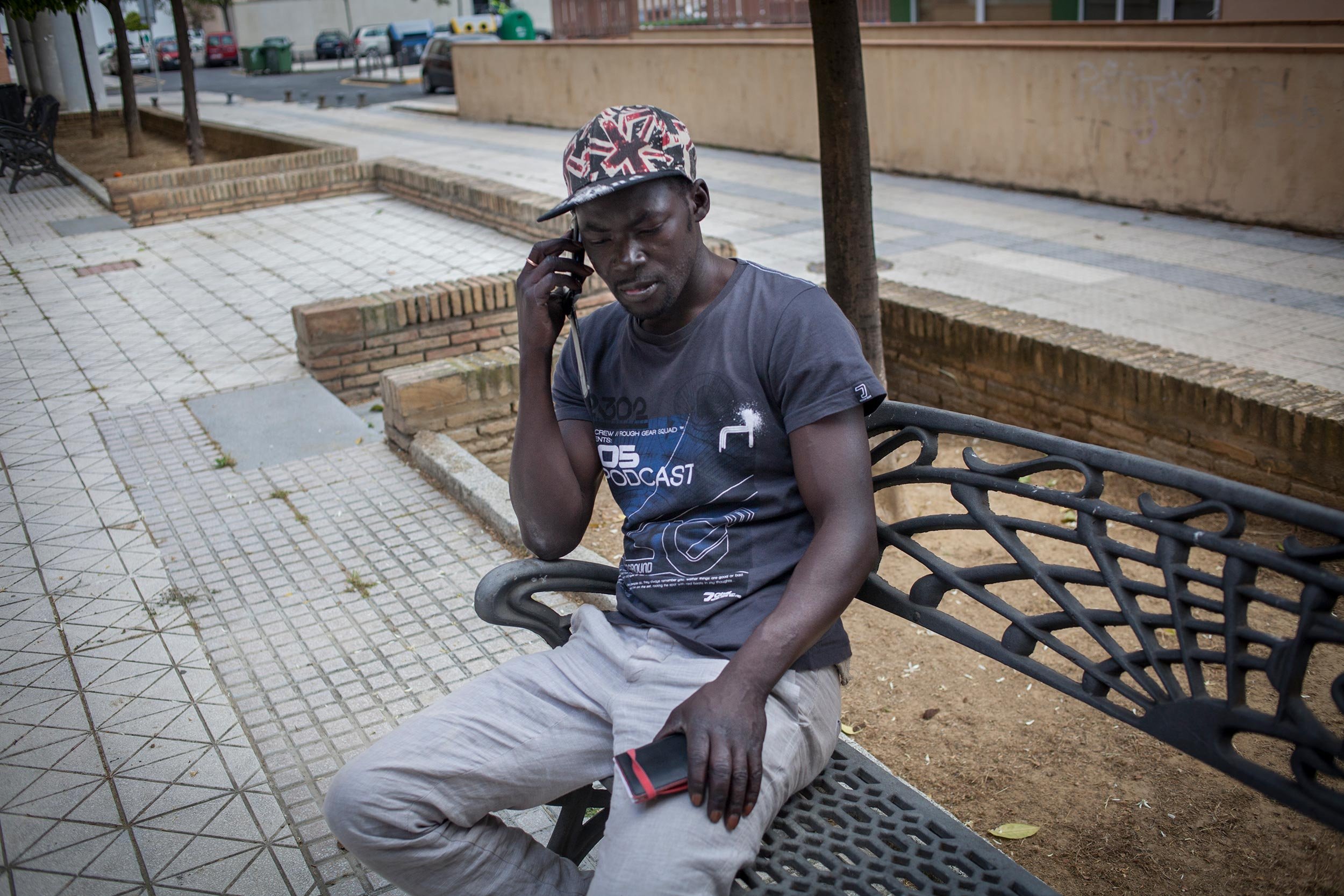
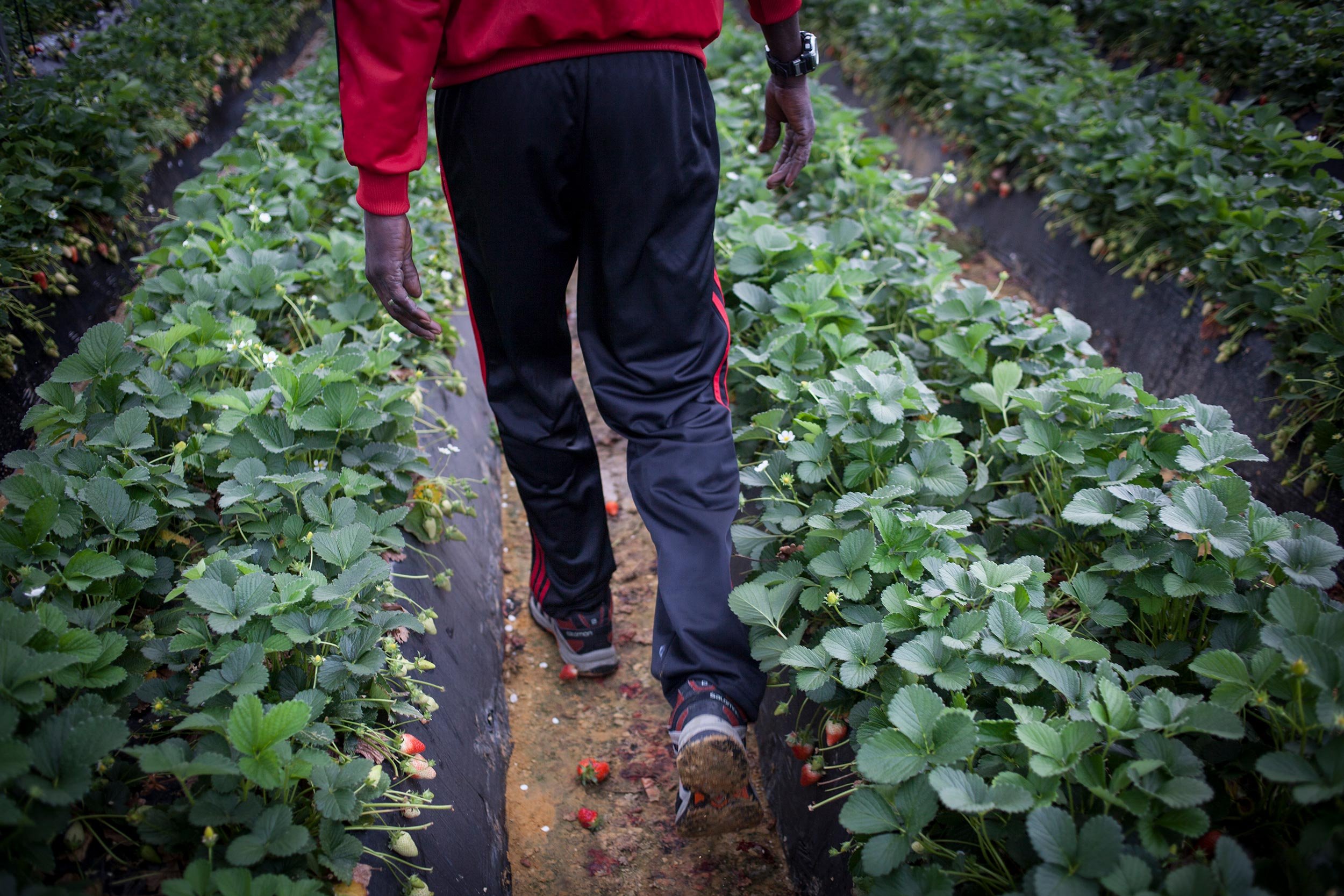
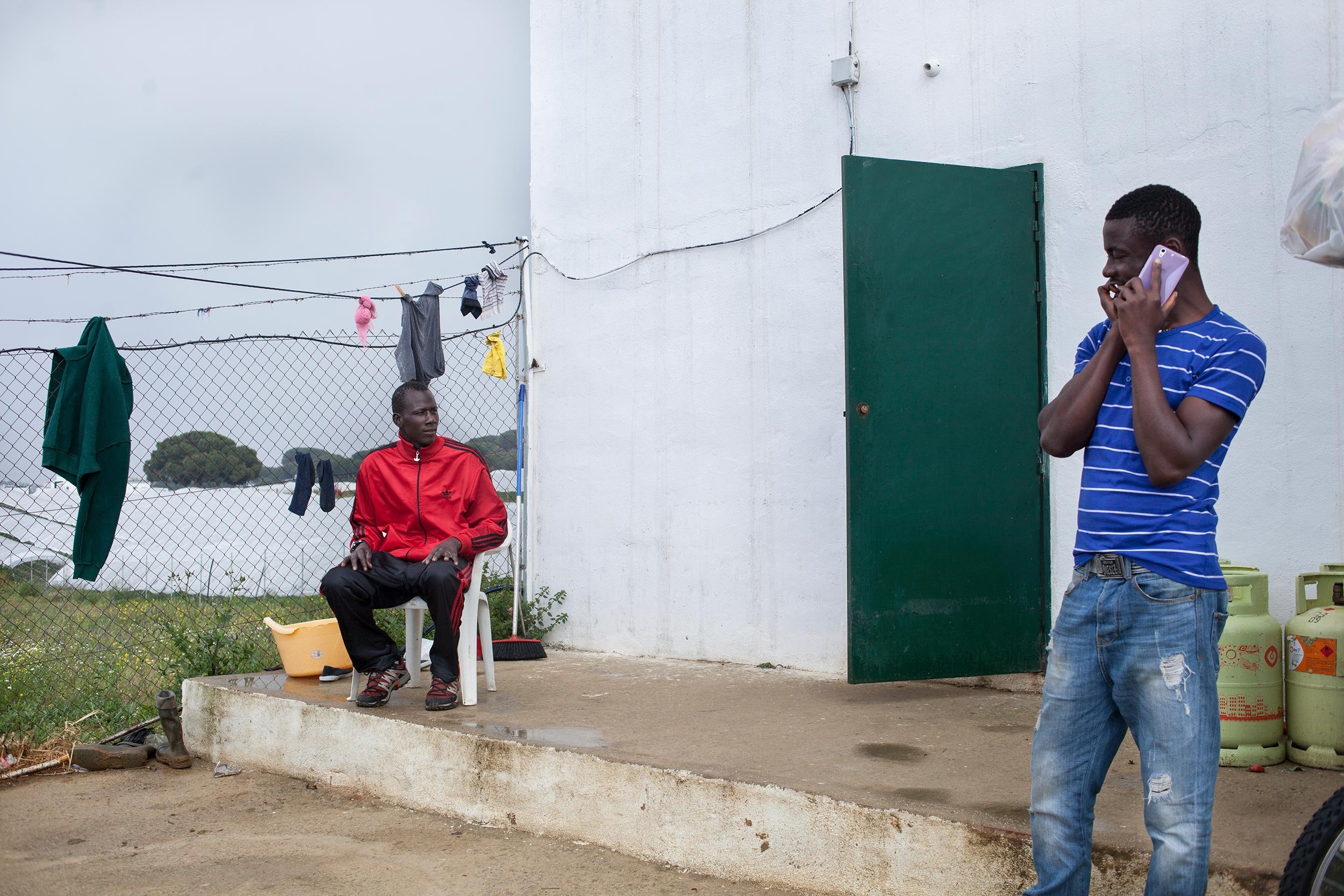

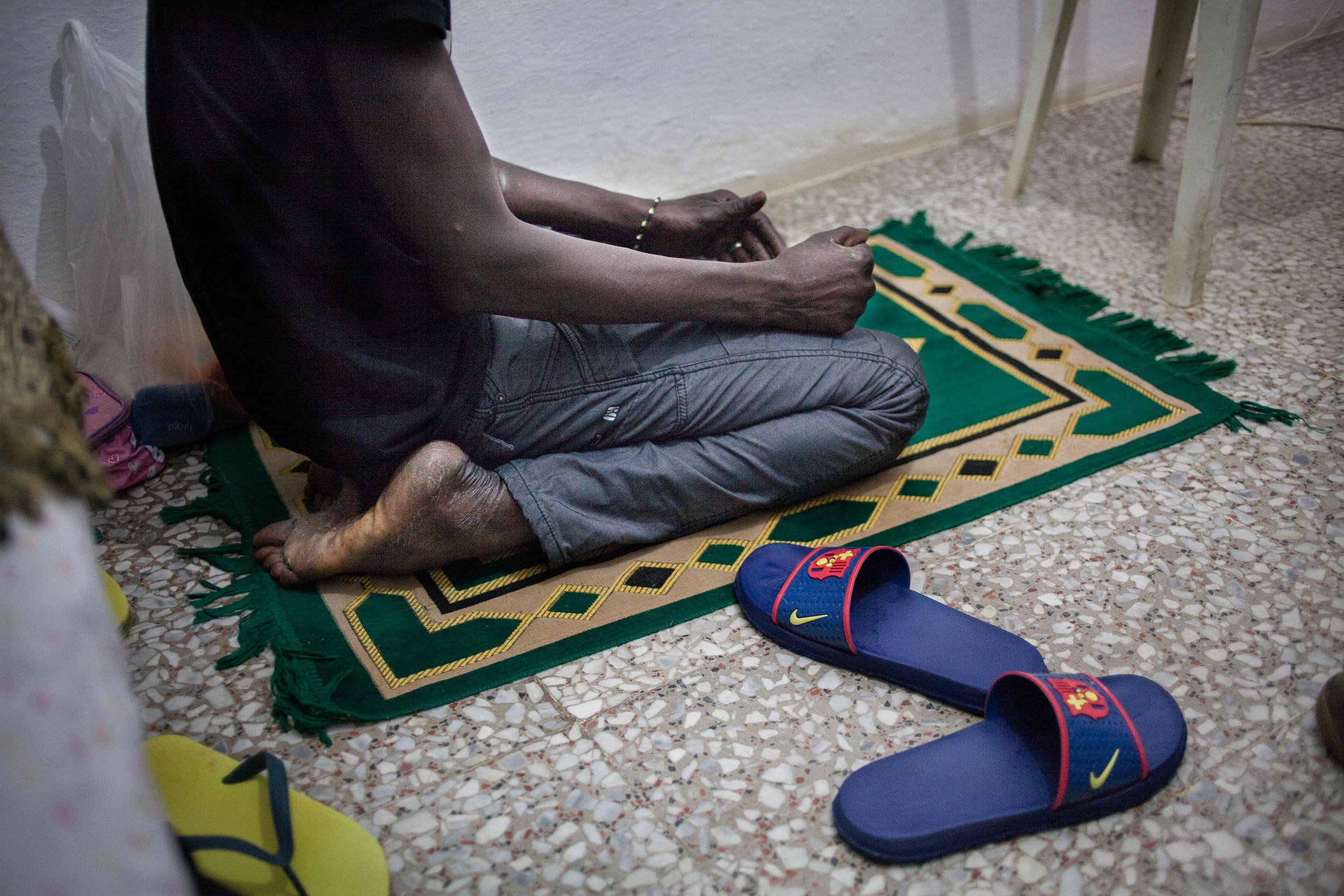
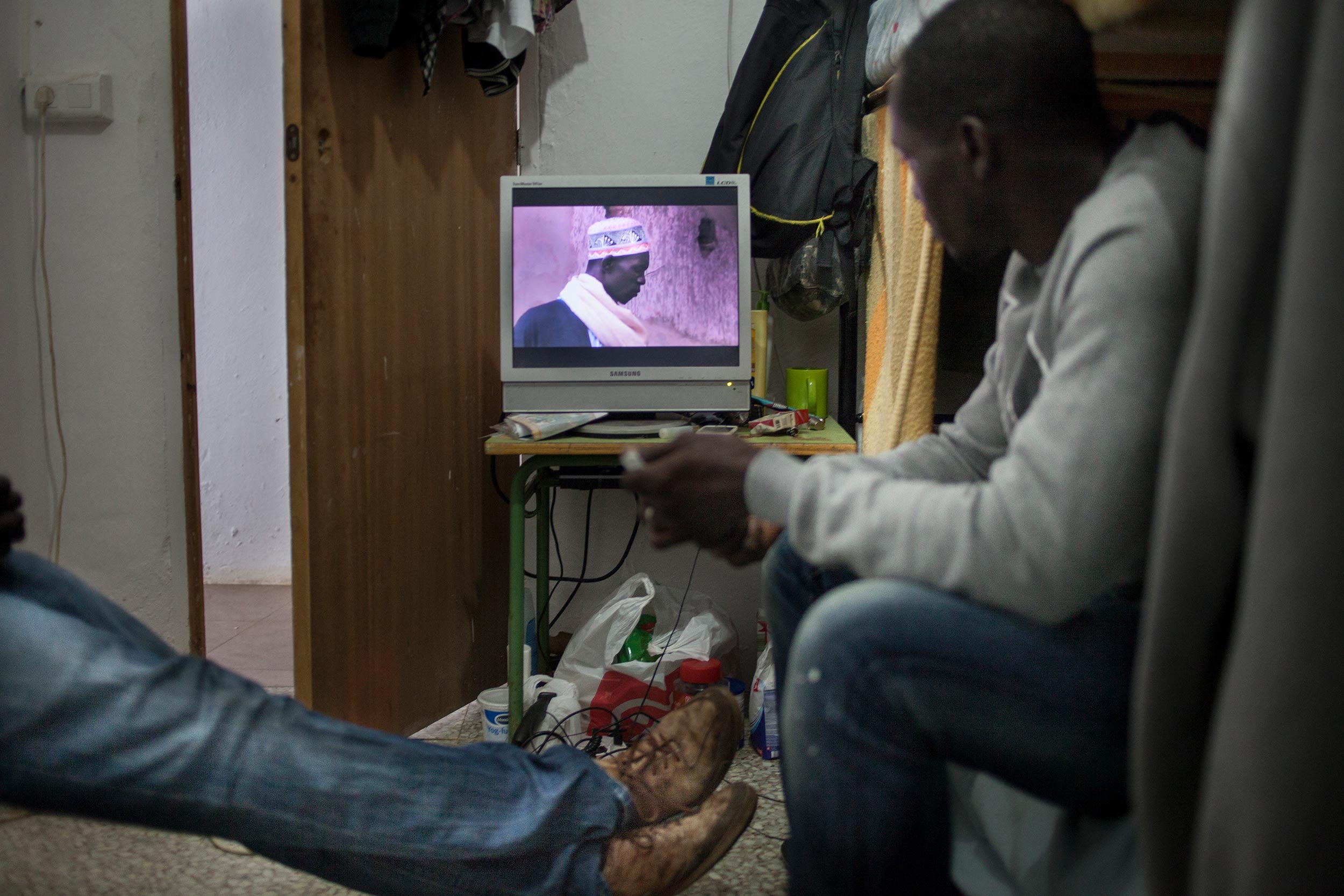


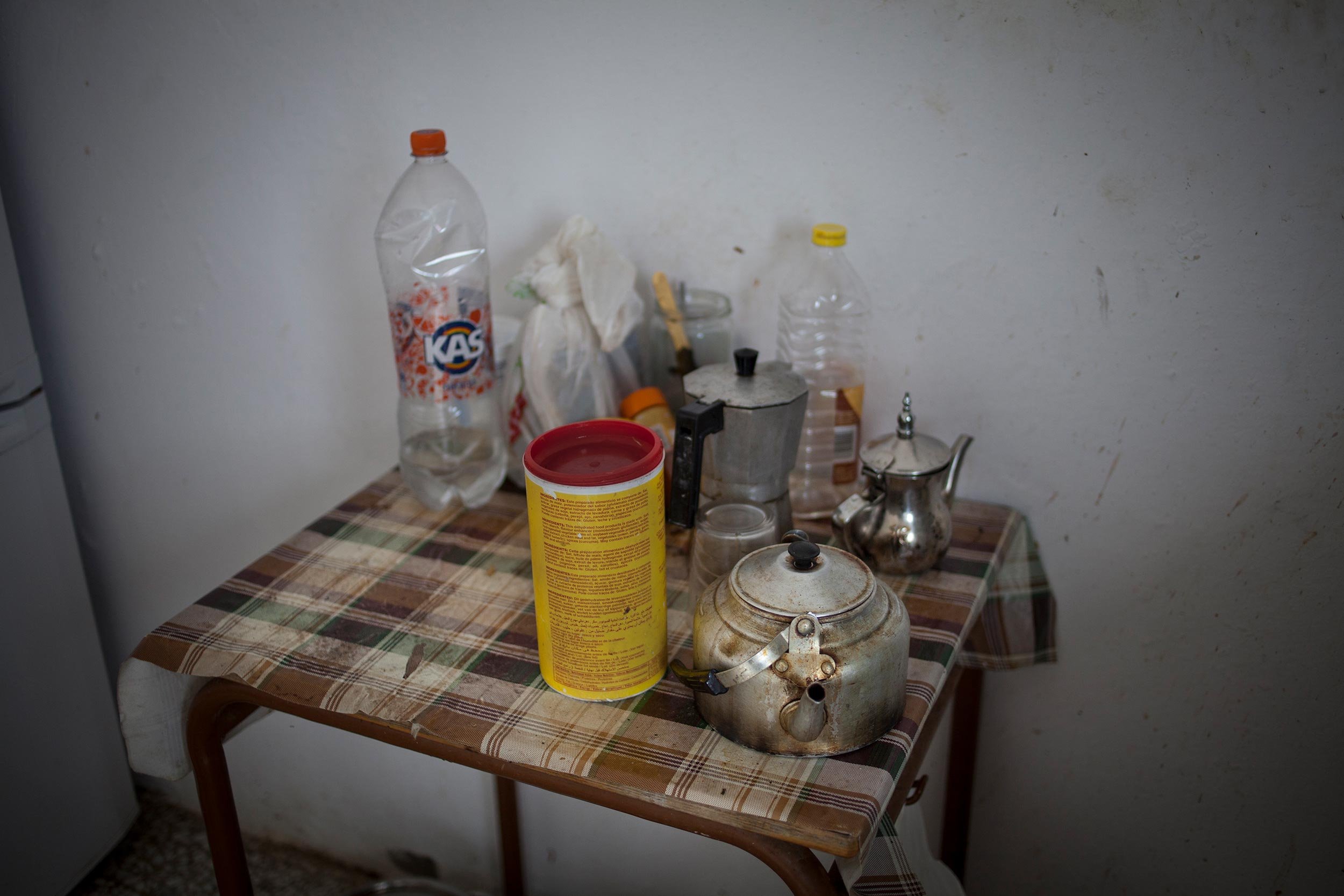




Chapter III. Migrant seasonal workers in the Spanisch financial crisis 2014.
Years ago, immigrants worked in the olive harvesting because most of Spanish people did not want to make this arduous work. Now, since the crisis in Spain, people have begun to lose their jobs and the only option they have left is to work in the fields, leaving no vacant for the immigrants. Jaén, Andalusian city in Spain, is one of the stops for these seasonal immigrants who cross the country working in the different agricultural seasons. This is the destiny of many immigrants when they arrive to Europe. After a long and dangerous journey to arrive to Spain they must find a way to make a living here and send money to their family in their home country.
November - December 2014. Jaen Spain.
„I‘m aware that we‘ve taken jobs form the hands of many of these immigrants“ says Angel, a Spanish citizen who used to have a very good position in a construction company and was forced to work in the in the olive harvesting after the crisis.

